#in conclusion FUCK THE SOVIET UNION
Text
you ever watch an entire video essay and come out of it literally not knowing what the conclusion was meant to be, and find yourself yearning for like 2017 when it didnt feel like everyone and their nan were making video essays?
#kai rambles#im just#it was an hour long#i watched it for an hour#he contradicted himself every new chapter and literally nothing he said followed on from what he said before#there was a conclusion#no idea what it was#ahhhhhhhh#similarly the other say youtube recommended me the uh authoritarianism video by second thought#the videos about 23 minutes long#he doesnt mention nazi germany until minute 18#he also just makes incomparable comparisons between the ussr and modern day america#and like hes very charitable to the fucking soviet union#he also claims that modern day chinese police havent killed anyone in years which like i get that theres a lot of anti china propaganda#in the us and its not as bad as its made out to be but its still an authoritarian dictatorship#like i get america bad but also other countries can also be bad??#anyway the guy basically equates authoritarianism to socialism which o-fucking-kay then#youtube has been recommending me more leftist commentators recently and so many of them are just insanely ignorant americans#whose entire politics can be summed up as ''america bad'' and they get so caught up reminding you of that every thirty seconds that they#just come out with wild takes like north korea good actually or the war in ukraine was because america wouldn't stop aggressing russia#so yeah they shouldnt have invaded but it wasnt unwarranted and part of ukraine is ethnically russian anyway#like sir????? why are you repeating russian propaganda???? what youre saying it literally neo nazi propaganda what the fuck???#i heard that one a week ago and its still in my fucking head like jesus fucking chridt
6 notes
·
View notes
Note
Here are the issues I have with the book. Since it's a lot, I'll try to keep it as short as possible and only mention my biggest problems with it. So this list is not complete and I could write pages about it.
Let me start by saying that a good autobiography (or any book that highlights a real life person) should be balanced. It should not glorify that person or pretend that person is a god and without mistakes. I also have no problem with critizing Ze, because, let's face it, yes he made mistakes and fucked things up in the past and not every war decision or speech or whatever was good or perfect. The point is: the critique should be fair and balanced (this obviously doesn't apply to bad people in general and the books about them; but since Ze isn't a bad person...you get what I want to say). The portrayal of Ze in the book is anything but fair or balanced. Or true, for that matter (unless literally every person in Ze's life and who knows him better, including the Kvartal fam, Olena, Andriy or people like them, have been lying to everyone for decades).
Throughout the whole book Shuster does say that Ze is Ukrainian (and Jewish) but also always tries to paint him as an "Ukrainian Russian" - so Ze is actually Russian despite being a "Ukrainian" (basically using one of Russia's Propaganda lies). Ze is basically a stubborn "Ukrainian" who kind of deserves all the hate and arrogance he gets from "real Russians" during KVN times (and later) because Ze is an insufferable asshole during his KVN times. And that Russian treated Ukrainian (or from other former Soviet Union countries) teams badly (including racist remarks, looking down on them, treating them like slaves, insulting them, not giving them a fair chance,...) teams awfully is, in Ze's case, deserved. Because Ze was oh so focused on always winning - no matter what and the cost.
Speaking of KVN: According to Shuster, Ze was terrible as a person during his first years of stardom. A maniac who only lived for applause and needs it to survive and was willing to do absolutely everything to win and beat other teams. Because, you know, he's so obsessed with winning. To a point were even he gives a flying fuck about the Kvartal team and their members (Shuster basically hints that they all disliked Ze and he was some kind of group dictator who only wanted to work and win all the time and was reckless and took to many risks and almost destroyed everyones lifes). When Shuster finds something positive to write about, he quotes people from Kvartal but what he quotes are just general statements or people saying what KVN was like during the 1990s and early 2000s. The moment Shuster writes about Ze and was he (allegedly) like during this time it's almost only "team members" and "people who knem him" and "classmates" and all that stuff - so anon sources. Or it's just Shuster telling stuff without saying what his source is or him just have feelings and thoughts and drawing conclusions. If people get named they - surprise, surprise - have a lot of times bad things to say about Ze or are people who we never ever have heard of as being part of Ze's life. Btw, it's not very hard to guess who the "team member", who talked the KVN years and adds a lot of negative talk about Ze, is... . Denys (yes, THAT Denys) contributed to the book with pictures, so chances are high he also talked to Shuster. If you ever wondered if the asshole would ever get over the fact that he fucked up and Ze kicked his ass out of the group - well, the answer is no. He now just tries to cash in on Ze. And since we are talking about Denys' obvious contribution to the book - he, once again, gave out private photos. How much we all wanna bet that he, once again, didn't ask for consent?!
Shuster also tries to paint Ze's family in a bad light. The father a tyrann who sacrified his wife's (Mama Ze) health for his job and money. Also rarely being at home and giving a fuck about his son and family. Mama Ze spoiling her child and making him entitled. Both to unloving and hard and more or less making Ze's life a living hell. Also that Ze's family was suddenly rich. Not to mention indirectly questioning the trauma his family had to go through (and Ze talked about in the past) under Stalin and the Nazis and family members that are suddenly alive (despite Ze stating in the past that they were dead). Also, Shuster sees in the childhood and family of Ze a part of the explanation why Ze is such a horrible person today, to stubborn to just give up and end the fight (and all that nonsense) and won't win this war. Because the parents put Ze in all kind of activities without him finishing any of it but letting him believe he can do everything and always demanding excellent perfomance in every aspect of his life (to keep it short). So of cooourse Ze had to grow up into a maniac who can't loose and always continues despite what people may tell him and who needs the constant validation and love from others.
There are also a ton of negative remarks about Ze as father and husband in regard of his own family. Not to mentiont hat a ton of informations are factually not correct. Things like birth dates or dates in general, how and where Ze's family lived (missing important context several times), Ze basically being as awful as his father, Ze not giving a fuck about his families safety during the war (Olena was the voice of reason who protects the poor, poor children because their father just wants them back for egoistic reasons and doesn't care about their safety) or not seeing anything concerning about his sons military obsession and instead fueling it (again, it's the poor poor wife who has to protect the son from the awful father), Ze giving zero fucks about his relationship with Olena right from the start and that poor, poor, poor woman always staying behind and having to go through hell and hate because of Ze's maniac ambitions and facing an unsave future in the early 2000s because Ze was so full of himself and had the biggest ego,... . (reading several parts you would think that this "poor, poor woman" is trapped in some abuse situation or Ze somehow tied her to himself and the whole marriage is fake and there is no love) (also Olena simultaniously romantizing things and her life and Ukraine but also being the only who who sees the truth about Ze or several parts of their lives but, of course, can't tell her terrible husband because bad, bad Ze) Also Shuster indirectly claiming that Ze and Olena lied about their relationship and they didn't date for eight years but for a shorter period of time. Because suddenly Olena also was a part of KVN long before Ze (???) and was essentially just his work buddy and friend for a while and somehow and for whatever reason they ended up in a relationship one day. (Also prepare yourself to read about a new version of the "Basic Instinct" story we never have heard before...and Ze and Olena never said.)
Btw, the way Ze is portrayed during his KVN years is essentially with little variation how he's portrayed in later stages of his life. Including his presidency and the war (I'm not going to write several more paragraphes because I think you get the picture Shuster tries to paint of Ze).
Only one thing about Ze's war portrayal: Shuster swings back and forth between Ze as wanna be dictator who will turn Ukraine into something bad as soon as the war is over (and is already starting with that) and who already makes his own rules and gives zero fucks about people and is only interested in his own fame and people applauding him and all that stuff. And Ze being the worst President ever because the war and the current state of Ukraine (which is, of course, very bad and they are about to collapse and loose and big Russia and winning and blablabla) are somehow also his fault. Yes, Shuster really manages to make Ze (and with that Ukraine) partly guilty.
Throughout the whole book he also, sometimes more obvious sometimes hidden, Shuster portrays Ukraine in the worst way possible. He does mention how "bad" Russia is but somehow justifying it several times or leaving out important facts and, once again, context. Also the portrayal of Putin, especially in comparsion with how he writes about Ze, is a joke.
Oh, and, the "inside look in the bunker" life Shuster used for his marketing campaign and that the claim of the book - yeah, bullshit. It's nothing now and anon and all that stuff. Also, once again, portraying Ze in a bad light. Like, yeah, the first weeks of war affected him but to such a worrying point (according to Shuster) that Ze was actually unfit to rule any longer as President but continued (because, you know, he loves power sooo much...). And now he's the mini dictator of Bankova who is always grumpy and changed into a (an even more) awful person and... .
What can I say at the end?! As mentioned earlier, the book has a ton of fake news and wrong facts. It's incredibly poorly researched - if sources exist at all. A lot of times it's Shuster just sharing his feelings or thougths or conclusions or interpretations or whatever. Or just saying things without context. Or writing stuff without giving sources. And to be honest, in some parts it also feels like that Shuster just made stuff up.
If you have no idea about Ze and his life or know very little - that's not the book to get informed. If you know a bit more about Ze, you will surprisingly often feel that certain parts of "exclusive interviews" or "when I talked with XYZ" are strangely familiar...with interviews we all know from Ze's (and several other people) past...because it is these interviews. Just a lot of times missing context, shortening what was said, adding stuff or giving it a new meaning.
Speaking of using old stuff: Shuster also really used his old articles to include them in the book...to a point where it's basically almost word for word.
Overall, the book is in large parts poorly written (so poorly that you wonder how he became a TIME journalist in the first place).
In the end, you probably haven't learned anything new or interesting about Ze, his life, the war or Ukraine. When we talk about Ze, I may have read one, maybe two new things I haven't read before (but questioning both of them and will do research if they are true or just made up by Shuster). It's over 300 sites of wasted paper and ink. I know articles who did a better job than this "book". It's a waste of time and money. And in the end it's a Pro-Russia Propaganda book, trying to undermine the support for Ukraine and hurt Ze and his image (as well as Ukraine's). Shuster tries to be subtle at his try to do this but he isn't not. He tries to come off as critical thinker who wants to portray a balanced picture of Ze and also writes about the sides no one dares to talk about. But nothing about this is balanced. It's just 300+ sites of trashing Ze and backstabbing him and using every possible way. Same applies to Ukraine.
.
#thanks anon!!!#HOLY FUCKING SHIT#😱😨😰#im actually so shocked right now#if this is really the book than this is basically shuster trying to destruct ze and ukraine#ze and olena as well as his kvartal fam probably have better things to do right now but if this book has that many false informations...#...i hope someone at some point starts a law suit#im so shocked about what i just read#i didnt expect much from the book since shuster changed so many things about it#and my expectations were almost zero after his latest articles#but thats...something...#denys being part of that?! i probably should be shocked but after the le monde (?) thing im not really...#also read online that people think people close to poroshenko or other political opponents of ze as well as ares-asshole and people like...#...that are shusters sources#i agree with anon that a “balanced” look at a person is always good in suck a book#but also agree with anon that there is nothing balancing if that is zes portrayal#also agree with anon if this is zes portrayal than something really doesnt match up with what his friends family olena and people close...#...to him of from his life said about him since forever#i think its also highly suspicious that before all that (or presidency if you want to go further back) no one could say a bad word about hi#quite the contrary actually#but suddenly everyone thinks badly about him and hates him and ze is such an awful person and all that stuff#and using already existing interviews and his articles and pretend its exlucive and said it to him and its something new???? thats very wil
13 notes
·
View notes
Text
Okay, hear me out
I have a few headcanons about Grindelwald and Dumbledore.
And I will share them with you. Because I can.
Okay. Let's start with a fact that it isn't entirely my headcanon. Because I was largely inspired by one fanfic. I can't share it, because I cannot remember which one it was. Just that the author was Vladarg. So thank (or curse) him.
The duel between Grindelwald and Dumbledore happened on November the 2nd 1945, according to Harry Potter Wiki.
And after that Grindelwald was just imprisoned. Why "just"? Well, Sirius Black was sentenced to Dementor's kiss just for the murder of three wizards and thirteen muggles. And that if we were to count James and Lily. It is obvious that in the War with Grindelwald many more people lost their lives.
So the first part of my headcanon is that it was Dumnledore who made sure for Grindelwald to just be imprisoned. Old feelings and all that.
The second part consists of two parts: one major and one less major. Let's start with the second one.
The Grindelwald (just as Voldemort) is the obvious allegory for Hitler. And in his case it is even more obvious that in Tommy's. Here similar not only the speeches of a superior race, but everything down to the clothes and hair.
So I present to you the idea that Grondelwald worked with Hitler. He did not control him. Because fuck every idea that in any sense makes Hitler less responsible for his crimes.
Then a few facts from canon:
First: Grindelwald knew about the Holocaust. He knew about it twelve (or something like that) years prior. He had the power to stop it. Especially if we remember that Rowling is an idealist (in philosophical sense) and it is her universe.
Second: In "Harry Potter and Half-Blood Prince" it is shown that British Ministry of Magic works with Prime Minister. I don't see why the same logic wouldn't apply to Germany. So even if Grindelwald didn't support Hitler from the get-go, he worked with him after he came to power.
So, my major headcanon sounds like this:
Grindelwald knew about Hitler because of his powers. But they began their semi-official cooperation only after 1933 and it lasted till Hitler's death. Therefore, wizards under Grindelwald also were involved in Germany's position. Including the War time. Including on the Eastern front.
And they were worse than non-wizards there. Because magic gives power, great and horrible at the same time.
Soviet wizards wanted Grindelwald's head.
But Dumbledore dueled him. And kept him alive.
The conclusion? Dumbledore can't come to Soviet Union, because he will be executed immedeately.
That's all for today. Tune in at some other random day for more headcanons
3 notes
·
View notes
Text
I've also screeshotted the support of china and russia at the time to show you how you usually jump to nationalist conclusion... support this country and detract the other because of stereotype but like at the time china and the soviet union was fucked up... and y'all going againts putin like if he was a communist that fucked cape verde and brought more commies from cuba to explore cape verde ans end the portuguese empire on purpose to fuck us over again
0 notes
Text
Season 4 spoilers, I guess
Like I really do not understand why they had to overcomplicate and "explain" everything... Like honestly, maybe it's just me, but I really liked the upside down when it was just another dimension that existed along side ours and that's it. Because it made sense somehow by how simple it was. But now as it turns out it was all just a... Mind? A body? Of some telekinesis freak with a weird ass ideology that in all my honesty makes zero sense. Like that whole speech by Henry-Vecna-One is just so fucking dumb, I had to rewatch it on multiple occasions yet I didn't understand shit. Like, if we're explaining shit so much, maybe I've missed something, but how in the world of fuck was the upside down created? Why wasn't there an upside down for every hawkins lab kid? Or was Henry just extra special little voldemort type of boy that he got his own little hospital interior design looking dimension?
And that shit ruins their whole "Russia bad guys" plot, too. Because how the fuck did they find out about the Demogorgon and the Upside Down? Why do random people like Enzo (and I assume he's a pretty low ranking soldier, considering that he's just a prison guard, and like, I literally don't know why they just randomly give this top secret information about some "american monsters" to some fucking betacuck no swag looking motherfuckers, and not just keep this secret information to the high-ranking circle of individuals within the military and the government. And I'm not even talking about the fact that they keep a fucking monster from another dimension who can climb walls in a prison full of unprofessional personnel (aka simple guards) and a nearby village (which is a whole another topic)) simply know about it? Or is it a gag about the american military not knowing how to keep info like this to themselves? But okay, whatever, maybe it's some cold war type of shit, whatever, alright. Why the hell no one in Hawkins knows about it though and why does no one know anything about it around Hawkins? Because my brother in christ, when soldiers just fucking roam around your little town in the middle of nowhere, you kinda start asking questions. But okay, whatever. Maybe people are just dumb and shit and would believe everything they've been told. But what I was wondering though, why the fuck was there a portal in the middle of nowhere in the Soviet Union? Did Henry randomly decide to go international? Did he accidentally misplaced a finger and targeted some Petya Vasechkin and not Peter Basildon like he meant to do? That just makes zero sense.
And don't even let me start talking about the characters this season. Like they geniuenly suck, big time. Robin is just a quirky little lesbian side kick who had her 2,5 gay moments and that's it. Steve is apparently horny and that's about it. Lucas is there. Dustin is Suzie's boyfriend. Suzie is a genius and religious (amen). That stoner guy whose name I fucking forgot. Mike exists to be a romantic interest. Will exist to be a romantic interest's romantic interest and to get those 2,5 gay moment to sturdy 4 gay moments. Eddie is alright, he's the star of the show. Eleven explains the plot. Adults are just fucking around with russian people. Russian people are not even russian. What am i doing with my life
Conclusion: i shat myself
16 notes
·
View notes
Text
Taste of a memory
Yelena belova x reader, one shot, mentions of missions during the red room, hopeful ending as usual, what is a pryanik
"Babe, what are you hiding there?"
When you came into the kitchen Yelena frantically hid something in a brown paper bag.
"How was your day, princess?" She tried to change the subject while weirdly holding the bag behind her back.
"You're distracting me?" You laughed and held out a hand, "Come on, babe."
"It's... it's nothing." She shook her head.
You couldn't help but be completely enamoured by this woman. Usually so fierce and strong, protective and confident. Almost a grown up. But now she was like a helpless kid, covering something she was, judging by the eyes... ashamed of.
"Are you sure?" You sounded softer. And your hand that was still hanging in the air gently landed on her shoulder. "Whatever it is, it's fine."
Yelana nodded. You sounded reassuring, you sounded familiar and cozy. And she immediately wanted to lean in your touch.
"It's fine." She echoed.
"You want to spend some time alone?"
Of course you didn't want to let her go. But it's how it worked with Yelena. Sometimes you had to let her reflect on the situation and make her own conclusions. You were the same. Of course later you would talk. Except once. You never talked about her sister's death. With this she wasn't ready to open up yet.
You let her leave the room. But before that made sure to touch the bare skin of her arm. Burn it, remind her she wasn't alone.
She was quiet for the rest of the day and the next day and the day after. You were there for her. Surrounding with attention, hugging with love, reassuring with affection.
You remembered how you sucked at it at first. Being in a relationship. In fact you both sucked. But she needed you more and in time you found that in yourself. You were the one who showed her how to resolve conflicts and stop when needed. But Yelena was the one who had to work harder, overcoming her insecurities.
You were ready for her reaction to whatever happened between you two, but you didn't want to, you hoped that those days were long gone.
In a week Yelena came to you herself. You had a stressful day with the marketing report you had to present. And when you came home you just poured yourself some whiskey and mindlessly were watching something on hbo max. It didn't help that you had a headache.
She sat near you and took your glass. "One of those days, princess?"
"Unfortunately."
She moved closer. She was ready. You placed your head on her lap and allowed her to massage your temples.
You were hesitant, you couldn't relax.
"Something's wrong?" Of course she noticed that you still were tense. Usually it took you just a few minutes to let go of everything.
"No, migraine is just stronger this time."
"You're an awful liar, princess".
You squinted. "Is it a bad thing?"
"No," She sighed. "Not really. I appreciate that we're being honest with each other. It's about what happened in the kitchen?"
"Babe, if you don't want to talk, I understand." You tried to stand up but Yelena didn't let you.
"I know. Tomorrow. I promise." She kissed your forehead.
You didn't sleep well that night. Subconsciously trying to get closer to your woman. Yelena didn't sleep at all.
When you woke up she was already gone. But when you returned from work she was at home.
You saw the same brown paper back on the kitchen table.
"Привет (hey)." Yelena greeted you. But she sounded different. Colder. "How's your migraine?"
"Thanks, it's a..." You couldn't stop staring at the bag. "It's fine."
"Curious?"
"Nope, if you think I shouldn't be." Weak attempt at a joke. But Yelena appreciated that. It was hard to keep her distance with you if you were trying to break the ice.
"Come here." You obliged. Once you were within her reach, she caught in a hug. "Promise me, nothing between us will change."
"Promise, babe."
Yelena looked right into your eyes. You weren't lying. You simply couldn't. You didn't know how to. She let you sit while she remained standing.
"I told you about my upbringing. Мои корни (my roots). My purpose." She heard your sigh and corrected herself. "My previous purpose. Previous life."
"Yes."
"Well, I never told you about my first mission. When I was 12. I had to go undercover to gather intelligence."
"Who could you possibly be when you're only 12."
"I was supposed to get certain documents from an engineer. And his wife often helped homeless children. It was just 10 years after the Soviet Union collapsed. And in Russia itself not everything was alright. Especially in further regions. For example in Tula."
"You were supposed to be one of the homeless kids god knows where?" You heard stories like this before from her. But when you're only 12? You couldn't believe it.
"Yeah. I had to take advantage of a good hearted woman. Get into her house. And steal the documents. Standard operation for a widow this age." She stopped for a second recalling details of that assignment. Her torn clothes, smell of dirt she had in her face, hunger in the eyes of the other kids. "But during those missions a certain approach had to be used. Chemical control had to be reduced for a child to have a more authentic behaviour. On such cases the Res room relied on propaganda they still were using on young agents."
You tried to remain stoic. But your eyes were already tearful.
"Oh, princess." Yelena brushed them away with her thumbs. "No need for that. It was such a long time ago. Don't weep for my past. Anyway, I succeeded, she noticed me. Every day I was with the kids, but every night I was back at the base. It wasn't that bad. And in time that compassionate woman let me into her house. She allowed me to eat there and get warm. She learned my name, my backstory. And with the mind controlling not being there I felt something for her. Then I didn't know what it was. But now I know it was love and gratitude."
Yelena stared for a few minutes blankly. Feeling those sensations long forgotten. Feeling the hope she had to stay in that family.
"But I was programmed. I was serving. I had no other choice. And in a few months I found the documents. When the family wasn't at home, I broke into the apartment and stole them. But on my way to the car, that woman saw me. She saw their folder. She understood. And that was the first time I've seen the exact moment I've destroyed a person. Not physically, sure. But she thought of me as a daughter, as a member of the family. But that's not all."
She leaned to you for a kiss. Cold, detached, calculated.
"I fucked up on my first mission. Of course I was punished. But I didn't care. With the chemical I only cared about the less than stellar result. And in a few years I accidently discovered that the red room killed her, because she saw my face. I... of course now I repent. But what's the use of that. She is just one of many."
"It was never your fault."
"It's complicated. You know that better than anyone. And that feeling that I understand now, it even had a taste and a smell then. Cause Людмила (Lyudmila) was giving me a certain thing that Tula was famous for." She gestured to the bag. "Пряник (pryanik)"
You opened it. And there it was. Made from flour and honey. Sweet and aromatic.
"I buy myself one once a year. To..." She shrugged. "I don't even know why. Maybe to get that childish feeling of hope back. Is it weird?"
"No, of course not."
"Yeah, I guess." She muttered to herself.
"It is not weird. I understand. I mean. I think I do. It's normal to try to relive memories.' You stood up and poured yourself some water.
"Very bitter sweet ones. But you know. Now it's easier for me. With you and Fanny....'' Yelena almost had a shadow of a smile. "Try it."
"Sure." You took a bite of this pryanik. "Well, it's really sweet."
"It's supposed to be, princess." She sounded playfully annoyed. "Appreciate it."
"I do. And you know, I guess I can cook it for you." You said carefully.
"Well, that definitely makes the sensation far less bitter. Promise?"
"Promise."
Of course it wasn't the end of the conversation. You were returning to this topic time and time again. Working it through, searching for an answer. At times it was ugly, at times it was tearful, at times annoying. But you were ready for that,both of you. Oh, and you kept your promise. You learned to bake for her.
#black widow 2021#black widow fic#marvel self insert#yelena belova#yelena belova fanfiction#yelena belova imagine#yelena belova x reader#yelena belova x you
135 notes
·
View notes
Text
There is a clear shift of paradigm in blockbusters in the early 90s. Until then, nuclear weapons were always portrayed as disastrous, which they are. Examples: Beneath the Planet of the Apes (1970), The Day After (1983) and Terminator 2: Judgment Day (1991). Nuclear bombs were cause of apocalyptic events, its consequences shown quite vividly.
That changed afterwards. Hollywood treated nuclear bombs as the solution for disasters, rather than as cause. When in doubt, nuke it! Examples: Independence Day (1996), Deep Impact (1998), Armageddon (1998) and The Core (2003). Got a bad day? Nuke your way out of it!
What is striking to me, though my knowledge on movies may be incomplete, is that this shift so clearly happened in the early/mid 90s. Why might that be? Well, until a few years before that, there was the “bad Russians” to keep under control. While everyone knew nuclear bombs are bad, they were needed “to make them afraid of attacking us first”. Once the Soviet Union had fallen into pieces, that didn’t seem to be an issue anymore. So why should there still be nuclear weapons in the world? Well, let’s have Hollywood think of some scenarios where they might be handy, so people don’t think of protesting against nukes, eh?
In conclusion, fuck the complicity of Hollywood and the American military, especially when it comes to weapons that can destroy the planet
112 notes
·
View notes
Text
JACOBIN FICTION CONVENTION MEETING 24: THE MARRIED COUPLE OF THE YEAR TWO (1971)

1. The Introduction
Hey, Citizens! Welcome to Jacobin Fiction Convention!
Okay, so. Today we’re looking at a romcom, of all things! A romcom that became a blip on my radar by accident. At first, I must admit that I didn’t want to review this one at all.
I hate romcoms and find them boring as fuck, so I really wasn’t looking forward to watching this movie. But it is Frev media and it is obscure so why not?
Unfortunately, finding this movie was a pain in the ass because the English version is on Apple TV (which I don’t have) so I had to resort to watching online in Russian, as there is a Russian dub which was made in the Soviet Union. Was the experience worth all the trouble?
Well, let’s try to find out.
2. The Summary
After emigrating from France to America and becoming a wealthy businessman, Nicolas Philibert wants to marry a daughter of his business partner. Problem is, Nicolas already has a wife back in France but, fortunately for him, divorces are much easier now that France is a republic, so he returns to divorce his wife before moving on.
However, upon seeing his wife court other men, Nicolas realizes that his own love has been rekindled.
Now, I have to admit that the idea of a Frev romcom could be done right, but we’ll see what happens here.
3. The Story
(Spoilers ahead!)
Like I said, I find romcoms boring as fuck, especially if all the romance is the main plot. Unfortunately, that’s exactly what we get here so I barely got through the story without quitting.
That, and it unfolds like a stereotypical romcom about a struggling couple. The couple not divorcing and staying together? Check! Old flames rekindled? Check! Romantic rivals? Check... You get my point.
However, what irks me the most is that in the finale the main couple is still bickering so their conflict isn’t even fully resolved! Satisfying ending, my ass...
Also, most of the comedy is slapstick and I don’t like those much, maybe because I personally grew out of the age when kids usually laugh at slapstick, but that’s just me.
That being said, I like the refreshing choice of setting the story outside of Paris. In Brittany, to be specific. Sure, we don’t see most historical characters but it’s a bit refreshing to have original characters only, you know? Unfortunately, that’s the only detail in the story that I liked so let’s move on.
4. The Characters
Unfortunately, most of the characters in the movie are fucking assholes.
Nicolas at first tried to marry a woman despite being married, a fact which he never disclosed and thus deceived everyone, including his bride. But he is also incredibly possessive of Charlotte upon seeing her with other men and, now he doesn’t feel like letting her go anymore so he tries to prevent her from having new relationships even after he finally gets a divorce! It gets so far that there’s a moment where he tries to pull Charlotte out of a moving carriage despite the obvious risks.
Charlotte is no better. She lies that her husband is dead, courts aristocrats left and right in hopes of getting a title (since a fortune teller told her she would become a princess) and is just as toxic as Nicolas. They fucking deserve each other.
Pauline, a Royalist Nicolas saves, wants to prevent her brother from having a relationship with Charlotte because she, Pauline, wants her brother all to herself. As in, incest... Yuck.
There’s a government representative who is... something else. He even kicks dogs. No, I’m serious.
And so on. Personally, I don’t really like stories where everyone is shitty but maybe it’s just not my thing.
5. The Setting
Actually the setting is quite beautiful and so are the costumes. Pauline’s costume of the Goddess of Reason (for a play) is stunning.
6. The Acting
Pretty decent, but a bit too exaggerated for my taste.
7. The Music
The music is good. Beautiful even. So at least we have something to praise here.
8. The Conclusion
Honestly, I feel like the time I spent on searching the movie wasn’t worth it. It’s just your typical romcom, and not a particularly good one either. It’s just bland and average.
Definitely don’t recommend it at all.
Okay, with that out of the way, our meeting has come to an end. Stay safe, Citizens, and until next time.
Love,
- Citizen Green Pixel
#french revolution#frev#history#jacobin fiction convention#the married couple of the year two#frev art#obscure frev media#frev movies#frev media
14 notes
·
View notes
Note
Apparently it’s an open ending for Detective Anna??? Russian fans were pretty pissed because they thought it was going to be a happy ending. And maybe there’s a season 3?? Man I knew I got m hopes up for nothing
you and me both, anon. i mean, i mostly clicked through the last four eps but just i’m like???
i don’t even know where to start bc what the actual fuck was that?? idk if you have read the interviews but the head writer and the actor who played pyotr said basically we’re gonna get a happy ending but also a storyline which could be explored in a potential s3. i think the words “happy ending” mean something totally different in russian bc that final was the farthest thing from a happy ending.
(spoilers for the final four eps)
anyways, turns out i was partially right that polina was one of the bad guys but they killed her off real quick and the real krutin was revealed to be skryabin. and ofc skryabin kidnapped anna b4 she could get married to yakov. like i’m actually pretty mad abt the ending bc this show has been my comfort show for like four months and basically the writers just were like "get rekt, leenu, no happy ending 4 u" but i feel for the russians bc they were waiting for s2 for four years (!!) and they got this clusterfuck.
i went to twitter and the russian fans are very mad and rightly so. one user basically said “i waited four years for this?? fuck that, i’m not gonna watch s3, fuck the writers”. and that is so sad bc that ending lit feels like a slap in the face. like you’d think that the writers learned from s1 bc s1 had yakov disappearing without a trace in the final and then the show was cancelled and some years later, they were picked up by another channel, basically getting a second chance, so it would make sense that s2 is gonna be closure for the long-time fans. but noooo. like the chances for s3 are quite high, i guess, but to be so ballsy and have s2 end like that... imo that was just so unnecessary.
they could have done something like this: anna and yakov getting married, the final scene being them dancing together, overjoyed bc they have been waiting for this moment for so long and then the camera pans outside where in the shadows is a dark figure who is focusing on anna and says something like “one day you’ll be mine“ and the camera shows skryabin’s face who is grinning ominously and then end credits. you see, anon? now that is a happy ending with also something to explore in s3.
and also what is gonna happen in s3, huh? bc anna is hypnotised and i don’t think yakov is gonna find her in a few days. so is yakov gonna find her after some years? and during that time so many godawful things could happen to anna. honestly, i feel sick if i think abt all that. and that final scene with nina (who ofc faked her illness and later, death) who was sailing into sunset and reading the news abt anna. that makes the clown in me think that nina is gonna save anna bc she owns yakov for helping her son and also her son is in zatonsk and i’m pretty sure nina would’ve kidnapped her son and moved away from russia with him.
and also there were two things that bothered me but they’re not that important. first off, anna and yakov had almost no scenes together in the final two eps. in ep40, they were just staring at each other for like 15 seconds across the street and that was it. sure, their eyes were killing me again but still the writers could have thrown me a bone or something. like they could’ve given us the actual moment when yakov proposed or maybe a dinner with anna, yakov and the rest of the fam but no, we flash-forward a month to the wedding day and then all that fuckery happened.
and the second thing that bothered me was that there was a new character in the final two eps and i was very confused why did he get so much screen time, lit had more scenes with anna than yakov had with anna. bc i was clicking through the eps i didn’t hear his name so i went to twitter and found out his last name was ulyanov. that name told me absolutely nothing but then i saw that his first name and patronymic was vladimir ilyich and i just went “oh no... oh no, nononononoooo”. i googled ulyanov and sure enough, ulyanov also went by the name lenin... they brought in fucking lenin into the final. and i ask for what?? no, what the actual fuck is this fucking fuckery?? basically that was the final straw for me bc i was already quite pissed off abt the ending. but this made me lit fume bc lenin ofc was the first head of the soviet union and the soviet union occupied my country for more than half a century, mass-deported more than 20,000 estonians and ofc killed god knows how many people. so yeah... i may be overreacting but i lit do not understand why there was a need to bring in lenin, maybe when i get to see the scenes with subs i will understand but right now i’m just like 😐😐.
anyways, if there is a s3, i’m def gonna watch it bc i just wanna know how will it end but i hope that s3 will be the final season bc ffs just let those characters be happy for once and maybe they could get the s1 writers back as well. and if there isn’t, well then i hope the russians will write a lot of fix-it fics. but in conclusion, overall i did enjoy s2 but yeah... the final just broke me. but also... i found out that alexandra and dmitriy are doing another show together and honestly i’m kinda excited for that, even if there is not gonna be any subs. and if u are still reading this, anon, then i'm so sorry you had to read all of that and also u deserve a pat on the back <33
16 notes
·
View notes
Text
But You Can Never Leave [Chapter 12: The Mirror]
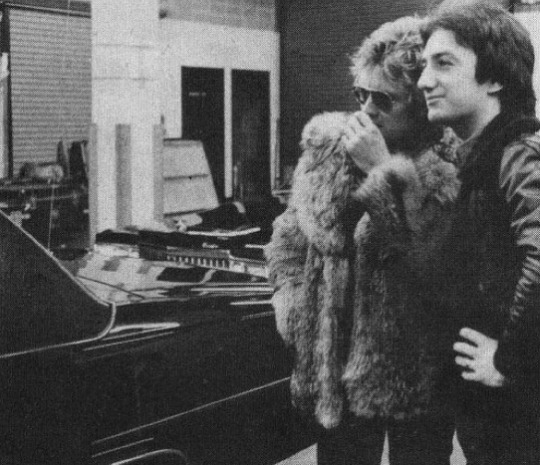
A/N: Hi y’all!! Please enjoy, this is a long one. We’re getting into the exciting stuff now, so I’ll be putting all my creative energy into BYCNL and will hopefully finish up the series within the next month. Thank you so much for your love and support! Each and every reblog/message/comment makes me smile and means the absolute world to me! 💜
Chapter summary: John gets a rap sheet, Roger gets defensive, Y/N gets suspicious, News Of The World gets a headline.
This series is a work of fiction, and is (very) loosely inspired by real people and events. Absolutely no offense is meant to actual Queen or their families.
Song inspiration: Hotel California by The Eagles.
Chapter warnings: Language, drugs, babies, drama, angst.
Chapter list (and all my writing) available HERE
Taglist: @queen-turtle-boiii @loveandbeloved29 @killer-queen-xo @maggieroseevans @imnotvibingveryguccimrstark @im-an-adult-ish @queenlover05 @someforeigntragedy @imtheinvisiblequeen @joemazzmatazz @seven-seas-of-ham-on-rhye @namelesslosers @inthegardensofourminds @deacyblues @youngpastafanmug @sleepretreat @hardyshoe @bramblesforbreakfast @sevenseasofcats @tensecondvacation @queen-crue @jennyggggrrr @madeinheavxn @whatgoeson-itslate @brianssixpence @simonedk @herewegoagainniall @stardust-killer-queen @anotheronewritesthedust1
Please yell at me if I forget to tag you! :)
You’re not late. You’re never late.
And at first that’s okay, it’s more than okay, it’s a relief; because it was too soon to have a baby anyway, less than a year into a supposedly meaningless marriage, a marriage you and Roger never even speak of, a marriage that might have never happened at all—might only exist as a particularly vivid and pleasant dream—if it wasn’t for your freshly-minted British citizenship. At first you greeted each dark, fruitless stain of blood with a casual ruefulness—oh well, one more month of freedom, you would think, smiling a little, worrying not very much at all—content to let that milestone trophy of womanhood, of life, lay undusted and unclaimed in the cluttered pit of your mental oak trunk with a tarnished gold latch shaped like a lion’s jaw.
After four months, you start to notice things. You notice the way Chrissie’s twins have small willow-green eyes that turn down in the corners, just like Brian does; you notice how John’s children have his downy hair and that innate sort of reticence that some people mistake for banality; you notice all those pretty, anonymous young women pushing strollers through the blossoming summer foliage of Hyde Park. You notice the way Roger grins and waves at babies when you see them in airports or hotel lobbies, dazzles them like he dazzles very nearly everybody, like he still dazzles you. You notice a longing buried in your bones that you hadn’t known existed.
After six months, you are no longer casually rueful. You start ignoring the calendar, as if not noticing you’re due could stop the bleeding from coming at all, like how you’re not supposed to stare at the clock if you want time to pass faster. You start watching what you’re eating, trying to get more sleep, opening all the windows when Roger smokes as he flips through fashion and music magazines with crafty little snickers, flashing those pointy canine teeth you once assumed your children would have.
And now, after nine months—as the world hurtles towards the conclusion of the brisk October of 1977—you have begun to worry; because maybe this thing, this thing that everyone accepts as a guaranteed feature of the all-inclusive package of the human experience, isn’t something you get to have at all. Roger doesn’t say anything, doesn’t ask you about it. He is as he always is: sunlight and joy and heat and raw kinetic energy. But sometimes Roger’s huge blue eyes—those eyes you fell in love with, those eyes that convinced you to follow Queen to London, to stardom, to thunderous stadiums all over the world—go vacant as he gazes out into the horizon, as the sun sets over the garden of the Surrey house, as his face is lit up in gold and amber and celestial fury like the wildfire his soul is made of.
And you’ve begun to worry about him, too.
~~~~~~~~~~
The phone rings from the nightstand. The shrill clanging, like hail on glass, makes you wince beneath the tangle of blankets. Your hand fumbles out into cool night air, which pours in from the open bedroom window.
Where’s Roger?
Then you remember his hushed voice, his bleached hair tickling your cheek, his lips pressed to your temple: Hey baby. I gotta go jam with some people. Grab a drink or two. You sleep, I’ll be back by morning.
Sure, okay, fine. Nothing out of the ordinary. One of those infinite casualties of fame.
You haul the phone to your ear. “Hello...?”
“Hello darling, are you busy?”
“Well, it’s 2:39 a.m., Fred. So not very.”
“Perfect. I need you to go post bail for John.”
You wrench yourself upright, rubbing your eyes with your free hand. “What?!”
“He was drunk driving and backed into a cop car, pure genius. I’m rather indisposed myself at the moment, and of course Veronica can’t know. And you’re so good with him, dear.”
Your feet have already swung off the bed and onto the plush white carpet. You wonder what Freddie is ‘indisposed’ with; there are so many possibilities these days. “And you know about this...because...?”
“He used his phone call on me, darling. I don’t think he wanted to bother you. I suspect he’s a bit mortified.”
“Yeah, well, he should be.” You sigh and start pawing through the safe in the bedroom closet, the spiraled phone cord pulled taunt. Hundred-pound notes shuffle weightlessly between your fingers. You remember when Queen had no money at all, when you and Roger shared a pitiful—dodgy, you amend—one-bedroom flat, when you had to assemble each bouquet and tie each ribbon for John’s wedding by hand; and you’re shocked by the nostalgia that hits you in the gut like brass knuckles. “Sure, I’ll go get him. Just tell me where he is and how much he’ll owe me.”
John is slumped on the floor of the jail cell, alone and sweated and miserable. His hair is in complete disarray. He peers up at you through the iron bars with red, swollen, unfocused eyes.
“Hey,” you say quietly, smiling although you know you shouldn’t be.
He covers his face with both hands and moans. “I didn’t want you to see me like this.”
“Too late. Freddie asked me to come get you, he was drunk or high or in the middle of an orgy or something. You are the worst drunk driver in the world, just so you’re aware. You are obviously not cut out for a life of crime.”
“So I’ve gathered.” He swipes at the strands of hair stuck to his forehead with the back of his hand, bites his lower lip, shakes his head with that thousand-yard stare that says: How the fuck did I get here?
You drop down to your knees to meet him at his level. The concrete floor is filthy, spotted with grime and dust and crushed insects and smears of what might be blood. “What’s going on, John?” you ask gently.
“I can’t keep doing this,” he murmurs. “It’s okay when we’re on tour. When we’re on tour I’m preoccupied and exhausted and too high on the rush to think about it too much. I’m numb. Mostly. But then I come home and it’s...” He glowers, balls his hands into fists, beats them clumsily against his thighs. “It’s this relentless fucking cycle of feeling dissatisfied and guilty and inadequate. A disappointment of a husband. A failure of a father. And it’s inescapable.”
“Well, the constant pregnancy situation probably doesn’t help.” Veronica is expecting their third child in February.
He waves a hand dismissively, rolls his eyes. “It’s part of the thing. The ‘being a good husband’ thing. I can’t fix that. Birth control is a sin or whatever. Jesus is too busy pissing himself over that to care about starving kids in the Soviet Union, I guess.”
“That’s a cheerful prospect.”
“Sorry.”
“No, please, by all means. Throw off all your baggage, I can take it.”
Now he smirks, just faintly. “That’s what we’ve always done for each other, right?”
“We’ll be back on tour in a few weeks, John.” And that was true; the News Of The World Tour was scheduled to begin on November 11th in Portland, Maine. The band would spend the 12th in Boston and join your parents for dinner at the Queen Anne-style house at the intersection of Apple and Arcadia that you grew up in.
He whispers forlornly: “I can’t run from this forever.”
“You might have to. I’d love to know what Slavic Jesus has to say about divorce.”
John coughs out a surprised laugh. “Thank you. I needed that.”
“Come on. I posted your bail. I won’t tell Roger if you won’t. You can put the extra five thousand pounds in your ‘fake my own death and go live on a tropical island’ fund instead of paying us back.” You’re not serious, and John knows that; he would never abandon his children, even if they weren’t old enough to really remember him yet. But it has the desired effect, which of course is lifting the mood, making John divulge that rare and beautiful smile.
“I’m a wreck. I can’t go home like this. It’d be worse than not coming home at all.”
“I’m happy to offer you one of our five superfluous bedrooms.”
“Okay,” John sighs, clutching the bars of his jail cell and dragging himself to his feet. “I’m so sorry. I owe you for this, I really do.”
“No,” you reply, grinning. “Just find a way to send me the coordinates so I can visit you on your secret tropical island once in a while.”
You drive John home to the Surrey house, get him set up in the spare bedroom with the blue-grey wallpaper and blankets patterned with seahorses, give him a stack of Roger’s clean clothes, lay out fresh towels and a tray of water and cookies—biscuits, you reprimand yourself—for him. He’s mostly sober now, which makes you feel somewhat better; still, you are aware that you hate the thought of leaving him alone, even if he’s only a few walls away.
“Thank you,” he says as you stand in the doorway, his face meditative, his hands in the pockets of his leather coat.
“Of course.”
“You’re a good friend. The best, actually.”
“You’re a good man. You don’t always know it, but you are.”
John just stares at you with an expression you can’t read. Like the ocean: always mysterious, always profound. “Goodnight,” he says after a while.
“Goodnight, John.”
As you pull the bedroom door shut, you hear erratic thumps coming up the staircase. Roger stumbles into the upstairs hallway, singing under his breath and drumming the air with invisible drumsticks, and holds out his arms when he sees you. He’s wearing his dark green suit, an unraveling tie, one sparkling pink Converse, his prescription sunglasses tangled in his hair and forgotten. His eyes are effervescent, flighty, almost manic.
“Hey, love of my life!” he cries, comically loud. “What are you doing up?!”
“Shhhhh! Your bassist partied a little too hard and needed a place to crash that wasn’t overrun with kids. He’s in the blue room.”
“Deaks? Deaks is sleeping over?!” Roger exclaims, beaming. “All my favorite people are here!”
“Yeah, but you shouldn’t bother him. He’s pretty messed up, he needs the rest. I’ll make everyone pancakes in the morning or something. Come over here, let’s get you—” But the words die in your throat as you try to tug off Roger’s suit jacket. Fine white powder sheds off the emerald velvet fabric and onto your palm. You blink at it, at the residue like crushed aspirin, like the salt they scatter on Boston roads the night before a snowfall. “What is this?”
He rips his sleeve away, conjures up a smile to throw you off the trail. To dazzle his way out of this. “Nothing.” But he knows. And he knows you know too.
“You were...snorting coke...?”
“Come on, baby, don’t be like that...” He tries to embrace you; you shove him back.
“Roger, no, this is...this is...” You shake your head, shrugging off the shock, searching for the words. You’re confused, you’re exhausted, your mind is whirling. “We’re home, Roger,” you plead, like it means something.
Has he done this before? When? How often? With who?
You should know the answers. It’s not a good sign that you don’t.
“So?” Now he’s indignant.
“So it’s not like being on tour, you’re supposed to take it easy at home, you’re supposed to be, I don’t know, relaxed and recovering and, and, and content...”
You’re not supposed to have an excuse to do all those things that destroy people.
He laughs bitterly. “What, ‘happy at home’?! When has that ever been me?”
“Rog, please, I’m not saying you can’t work all the time or drink or smoke, I’m not even saying you can’t get wasted, I’m just drawing the line at cocaine and I don’t think that’s a terribly despotic place to draw a line.”
“Oh I’m sorry, I must have missed it, when did you become too moralistic for drugs?”
“Acid is different than coke and you know it. Acid doesn’t kill people.”
He glares at you, savage, almost hateful. “You don’t get to put me in a cage.”
“I’m not being controlling or self-righteous, I’m being concerned—”
“You’re being a fucking cop, that’s what you’re being,” Roger snaps.
“What do you want me to say?! I’m a registered nurse, Roger, I’m a medical professional, it’s literally my job to keep you alive—”
“No, it’s your job to make sure we can record and tour and I need it, I can’t play without it, don’t you get that?! I fucking need it!”
Instantly, John is between you, still fully dressed and sweating Manhattans out of his pores and seething. He’s taller than Roger; surely you must have noticed that before. But if you had, you’ve since forgotten. “Roger,” he threatens in a low, unyielding voice. “Go to bed.”
Roger recoils, disoriented, then opens his mouth to protest.
“Go!” John roars, pointing towards the main bedroom. He wants to say more, you can tell, he has rage burning in him like dragonfire; and if it had been Brian or even Freddie, John would have said it. But this is Roger. And you can’t remember a time John has ever raised his voice to Roger before now.
Roger can’t wrap his brain around it either, particularly in his present condition. His eyelids flutter a few times, then he scoffs—a dismissive, derisive sound, a sound that says I don’t know what to do with this information—and staggers away. He slams the bedroom door behind him as he disappears inside.
You collapse against the nearest wall and hiss in ragged breaths through your teeth, your eyes wet and stinging, your hands trembling as you press your knuckles to your lips.
“I-I-I’m so sorry about that,” you whisper, avoiding John’s eyes.
He’s going to say something, something harsh and terrible but true. He’s finally going to tell me how stupid I was for ever thinking this could work, just like Chrissie and Freddie and Brian. He’s going to tell me I deserve it.
Instead, John offers only this, his words flat and hollow: “Yeah. I’m sorry everyone is disappointing you tonight.”
And then he’s gone.
~~~~~~~~~~
In the morning—early afternoon, really—Roger doesn’t remember; or at least he feigns convincingly that he doesn’t. He props his feet up on the kitchen table and shovels down six pancakes and theatrically relays to you all the scandalous celebrity gossip in the News Of The World magazine with his prescription sunglasses perched bookishly on his nose. He asks you three times if you’re alright, trying to read the hesitance in your eyes, to unearth all those questions that are taking up a permanent residence there. You smile and nod, sip your tea, watch the sharp autumn sunshine as it streams in through the windows and bathes Roger in luminescence that seems so benignly interminable in the light of day. And when you peer into the bedroom with seahorse-patterned blankets and walls the color of cold rain, John has vanished; but the air is heavy with the scent of a litany of cigarettes and there’s a handwritten note left on one pillow.
Thanks for everything. Hang tough, as the Yanks say. An island getaway awaits you.
~ World’s Worst Drunk Driver
At 3 p.m., John calls and asks if the Taylors would be interested in an outing to the park while he gives Veronica a few hours alone to catch up on housework without the kids. His tone is light, casual, harmless; but you suspect he’s checking in on you.
“Of course we’re interested!” Roger says, snatching his ostentatious fur coat off the back of his chair. “Baby, love of my life, go get some cash from the safe so we can buy the kids ice cream.”
Incidentally, there’s not much cash left in the safe; but you find a ten-pound note in your wallet for the ice cream man and make a mental note to run to the bank on Monday.
Hyde Park in October isn’t so different than Boston. The leaves above are a kaleidoscope of sunstone and rubies and jasper and jade, crisping and curling around their serrated edges, drifting listlessly onto pavement paths to be crushed beneath rushing feet; the roots of the trees are centuries deep. Chrissie is walking laps around the pond as she pushes the twins’ stroller; Evelyn is a fairly good sleeper, but Theodore—Teddy to his closest confidants, of which you are one—is an anxious baby and prone to whining. He’s definitely Brian’s son, you often find yourself thinking with an affectionate smirk. John’s ten-month-old daughter Anna is nestled in your arms in a semi-conscious state, having thoroughly exhausted herself by painting her face with chocolate ice cream and thereafter enduring an impromptu bath and wardrobe change in a public restroom.
Laszlo, two years old and with a mop of auburn curls, trots by the edge of the pond as Roger grips his tiny hand, periodically crouches down beside him, grins hugely and points out swans and fish darting through the dark rippling water. Laszlo shrieks with laughter and tries to steal Roger’s sunglasses, which glint in the sunlight like black mirrors.
“So your kid’s a convict too,” you say to John.
“Gotta train them when they’re still small and good for shimmying through dog doors and such.”
“How are you feeling?”
“Extremely hungover, but I’m trying not to show it.”
“You’re doing a good job, I wouldn’t have known.”
“Excellent. I don’t think Veronica noticed. She was very curious about how I ended up in a pair of Roger’s skintight leopard-print pants, though.”
You chuckle, glimpsing down at Anna, rocking her a little as her eyes flitter open and then close again. You and John are on opposite ends of a wooden park bench, your ankles crossed and resting in his lap, your hair rustling in the breeze. John peers over at you periodically, studies you like an ancient statue of Aphrodite or Perseus under a spotlight in an echoing museum, then resumes his sketching. Your smile dies as you watch Roger giggle with Laszlo, lift him high into the cool autumn air, trumpet mock airplane noises in that high, raspy voice.
“Come on,” John prompts, nudging your boots. “I’ll take the baggage if you’ll let me.”
No, I think I’ll keep this one to myself. But you don’t. “It’s my fault,” you say softly. It’s my fault we can’t have children.
John lifts his pencil from the page, his greyish eyes gentle. “You don’t know that.”
“Statistically, it is most likely my fault.”
“It hasn’t been that long, has it? Definitely less than a year. Sometimes these things take time.”
“They didn’t for you and Veronica.”
“Yes, well...” John frowns uneasily. “That’s not always such a blessing.”
“How helpful. You should write newspaper columns for depressed housewives. ‘Don’t worry about that infertility dear, you could have it worse, you could have a life sentence with someone you can’t fucking stand.’”
That was unkind, you think, immediately regretting it. That might have been too far.
But John doesn’t seem offended. His pencil flies over the paper as he glances over at you again. “Is that all? Please continue. I’m riveted to learn more about my alternative career path.”
“No, I think I’m done.”
“Okay. What’s your favorite flower?”
You consider that. “Roger always gets me carnations or roses...and I like them, don’t get me wrong...but I don’t know if I’d call either of those my favorite.”
“It’s not that deep a question, Miss Nightingale.”
“I’ll defer to the artist’s expertise. Surprise me.”
“I’m no artist,” John warns, but he returns to his sketching nonetheless. “I’m really sorry about last night, by the way. I was being stupid and dramatic and immature and self-pitying. ‘Midway on our life's journey, I found myself in dark woods, the right road lost,’ etcetera etcetera.”
You’re no great connoisseur of Italian literature, but you recognize those famous opening lines of the Inferno. “Can I ask you something?”
“Please do.”
“What is this fascination you have with Dante?”
“Truly?”
“Yeah.”
He smiles pensively with his eyes cast out over the pond. “I like that his story has a happy ending. That someone can start in hell and sweat out all their sins in purgatory and end up among the stars.”
You raise your eyebrows, taken back, impressed. “That’s awfully poetic.”
“It’s strange, probably,” John says, scrutinizing his drawing.
“No, really. I love it.”
“Yeah?” He’s doubtful, but he’ll allow himself to believe you if you insist.
“Yeah. And no more drunk driving or other acts of self-destruction, okay? Queen would crumble without you, John. And so would I.”
In reply, he rips the page out of his notebook and hands it over. The image is of you: so infinitely more lovely and at peace than you feel, eyes wise and contented and reflecting halos of sunlight, John’s daughter dozing in your arms.
Tucked behind your ear, etched in graphite shadows, is a calla lily.
~~~~~~~~~~
“Darling, what do I look like?” Freddie bats his eyelashes flirtatiously.
“A raccoon.”
His face screws into a grimace. “I’m supposed to be a cat.”
“Yes, I’m cognizant of that. But you look like a raccoon. Which is why people keep assuming you’re a raccoon, which is why you’re asking me now if you look like one.”
“Bloody hell,” he groans, puffs on a cigarette, fluffs his hair irritably, slurps a drink that is fizzy and sapphire blue.
“The problem is that you went with black and white. You should have dressed as a calico or something. Or a grey cat, oh, I love the chubby grey ones!”
“I’m a musician, darling, not a fucking zoologist.” He exhales a ring of smoke and meanders away.
Queen, the band’s associates, and various music industry figures are all milling around the night-draped mansion. It’s half a Halloween celebration and half a launch party for News Of The World, an album named for the tabloid that Roger both loathes and yet refuses to stop having delivered to the Surrey house. He can’t stand the thought of not being clued into the latest gossip, trends, fashion, awards, of missing any piece of what stardom has to offer. In the spirit of Halloween, Roger is dressed as a tiger, his sleeveless sequined shirt striped with orange and black. You are a veterinarian (not so far a cry from a nurse that you can’t repurpose your old uniform), John a shark (he’s taped a cardboard triangle to his back like a fin), Veronica a sea turtle in a teal dress and with a shell painted over her sizable baby bump, Brian and Chrissie both bright green aliens with antennae bobbing from their headbands. Mary is here as well—outfitted (quite appropriately) like an Enlightenment-era queen—but so is Freddie’s new boyfriend, a shy man named Anthony who is young and handsome and compliant and dressed as a mouse. Mary beams dutifully whenever Freddie is speaking to her, but her expression clouds over when he turns away. She no longer has a gold ring gleaming on her wedding finger, although she did gain an athletic blond date whom she seems largely indifferent to.
As Roger wanders through the crowd shaking hands and howling at jokes, you sip champagne by the snack table and devour an obscene amount of crab puffs. John and Veronica are chatting—unenthusiastically, from what you can tell—nearby with lamb kabobs in their grasps. John passes you a smirk every once in a while, an I’m so over this party and I know you are too smirk of commiseration, and nurses a Manhattan. Chrissie nibbles on disks of cucumber and baby carrots and not much else, which is very unlike her.
“You alright?” you ask worriedly. “You aren’t sick, are you? These crab puff things are incredible, I can’t stop eating them. I don’t know what’s wrong with me. I’ve had three dinners so far tonight, I’ve become a monster.”
Chrissie’s lips are a tight, humorless line. “I’m perfectly healthy, I’m just a cow.”
“Chris, honey, don’t!” You pat her shoulder reassuringly with one hand, pop another crab puff into your mouth with the other. “You’re gorgeous, and most women’s bodies change once they have babies, it’s natural!”
“Yeah, well most women aren’t married to men with infinite opportunities to upgrade.”
“Chrissie, no,” you murmur, pained; but you aren’t sure what else to say. She’s not wrong. I wish she was, but she isn’t. And she already knows that.
Dreams by Fleetwood Mac is playing from the reverberating stereo, Stevie Nicks’ sensuous, nasally voice climbing through air choked with strangers and cigarette smoke.
“Now here you go again
You say you want your freedom
Well, who am I to keep you down?”
Brian bids farewell to some record company executive he was talking to across the room and slips out onto the back porch of the house, and after a moment Chrissie follows him. You resist the temptation to eavesdrop until you can clearly hear their voices, raised and combative, through the sliding glass door. You glance to John, apprehensive.
You better go out there, he mouths, and so you do.
“Thunder only happens when it's rainin'
Players only love you when they're playin'
Say women, they will come and they will go
When the rain washes you clean, you'll know...”
Under cold October stars, Chrissie has trapped her horrified-looking husband, backed him into a fountain of a dolphin spewing an endless stream of water from its snout. “Did you think I wouldn’t listen to your own fucking album, Brian?!” She shrieks. “Who is she, huh? Who the fuck is she?!”
You grip her arm and try to lead her away. “Chrissie, babe, not here—”
“It’s Late, Brian? Yeah, it’s real fucking late in your life to still be chasing whores over in America while I’m building your family here, isn’t it?!”
“Love, please, it’s not true,” Brian attempts anemically, reaching for her.
“It is!” Chrissie rages. “It is and it always has been and I was too busy being some blind stupid idiot who loved you to see it!”
She breaks down in tears and you shove Brian away, shoo him back inside. You pitch him a fierce glare as he leaves, retreating like a kicked dog. There’s nothing you can do to fix this, you coward. Because everything she’s saying is true. Chrissie clings to you like a life raft, sobbing into your shoulder, asking what she did wrong.
“I’m sorry,” you tell her, over and over again; because that’s all there is to say.
Eventually Chrissie quiets, goes still and resigned and numb, and you help her fix her makeup and lead her back inside. You stand with her beside the snack table and swear not to leave her side until the party’s over, until the men are done celebrating yet another triumph that will take them further and further from home. Brian is nowhere to be found.
“That goddamn broodmare,” Chrissie hisses, gulping straight vodka, staring venomously at Veronica.
“Why do you hate her so much? I mean she can be dull, yeah. She’s sanctimonious and naïve and dresses like a freaking Mennonite. But she’s not horrible or anything.” And her life isn’t so perfect either.
“It’s not obvious?” Chrissie asks, her voice like a blade.
“No...?”
Chrissie’s eyes are scorching, although you’re not the person she’s furious with. You just happen to be standing in the path of the storm. “Because she’s the only one of us who’s never going to have to find out what this feels like.”
Oh, I don’t like that. I don’t like that at all.
You try to spot Roger in the teeming room. He’s over by a crackling fireplace, telling stories with dramatic sweeps of his hands, bleeding charisma like sweat, and none of that is unusual at all. One of the people he’s talking to is Dominique Beyrand, and that’s not so unusual either; Richard Branson ends up at a lot of industry events, and Dom trails him around like a shadow, nodding politely and contributing little chirps of conversation in that posh French accent.
But here’s the strange part; here’s the part you’ve never seen before.
When Roger flashes that dazzling smile of his, Dominique smiles back.
~~~~~~~~~~
Three days later, you’re steeping in a sweltering bubble bath as the phone rings downstairs. You ignore it at first, because the hot water is unraveling all the tension in your muscles and the lurking shadows in your mind, and also because the calendar is hanging right beside the phone in the kitchen and you’re quite committed to ignoring it this morning. But the phone rings again, and again, and you’re aware that it could be something serious; Roger is working on some non-Queen collaboration at a studio in downtown London, and something could have happened to him.
Especially considering his recreational preferences lately.
You scramble out of the tub, pull on a robe that sticks uncomfortably to your dripping skin, leave a path of bathwater footprints down the hallway and steps—slipping twice and clinging to the banister for dear life—before finally careening into the kitchen to snatch the phone off the wall.
“Hello?” you gasp, winded.
It’s not Roger, nor someone calling to inform you that Roger has overdosed or disappeared or vaulted down a staircase or been hit by a bus. It’s Chrissie.
“Have you seen the News Of The World yet?” she demands.
“Ummm, the album...?” Of course I’ve listened to the album. About a million times. You have a particular affinity for Spread Your Wings.
“No, not the album,” she snaps impatiently, although she kindly leaves out the you idiot addition that her tone implicates. “The magazine. Have you seen it today?”
“I was mid-bubble bath and almost broke my neck sprinting for the phone. So no.”
“Good. Don’t read a word. Don’t talk to anyone. I’m coming over. I’m gonna grab John and come right over.”
“Chris, what—?”
“Do not touch that fucking magazine!” she screams, and hangs up.
Naturally, you don’t listen.
You go to the main door of the Surrey mansion and open it. Sure enough, the new issue of News Of The World is waiting on the porch for you. You pluck it up with damp hands; the whirlpools of your fingerprints stick to the parchment.
On the front page is a photo of Roger, but he’s not alone. He’s scowling at the paparazzo snapping the picture, his face lit up by the flash, painfully and unmistakably stunning. He’s in some sort of alley or side entrance to a restaurant or club. He’s somewhere he’s trying not to be seen, which anyone could tell you is remarkable for Roger Taylor. Beside him is a woman you recognize; and although she’s looking down and trying to hide behind her shock of lustrous black hair, you can see her lips are smiling.
The headline reads: “Queen Drummer Spends Royally on London Love Nest for French Mistress.”
86 notes
·
View notes
Text
pinky and the brain - s1e6: brainania

i’m running on like the barest dregs of energy let’s fucking do this leeroy jenkins
episode summary: brain needs to build a Very Big Tumbly Drier. he needs a lot of money to build a Very Big Tumbly Drier. he decides the best way to do this is to.... invent a country and scam the us out of a foreign aid cheque.
hm.
the rundown:
it’s acme labs!
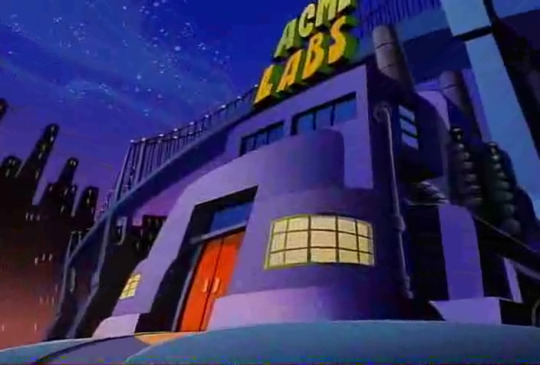
there it is.
as we zoom in a little, we hear pinky laughing maniacally at the very mention of tom ruegger, while a couple of women are dead on the floor.

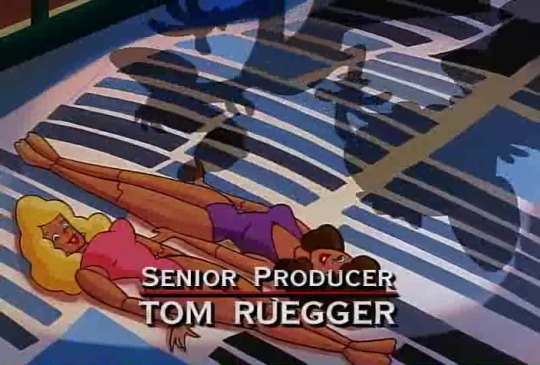
hm.
SPEAK TO ME, PHYLLIS, SPEAK. as it turns out, things aren’t quite as dire as previously thought, as pinky affirms that brain looks “simply fetching.”

narf.
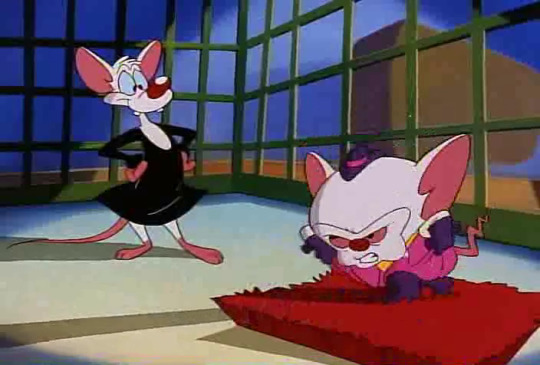
“these are the only garments i could obtain. and besides, you are no helen of troy yourself.”
ignoring the fact that he chose to wear the hat and the gloves as well, brain moves onto explaining his latest plan--
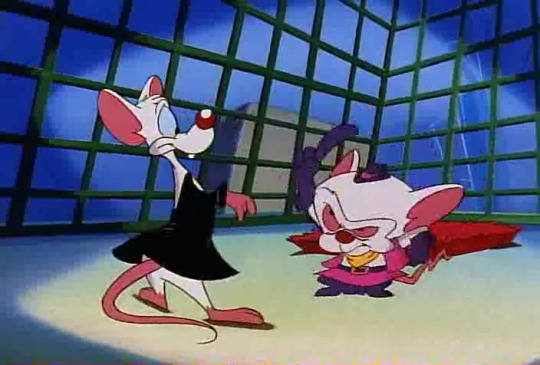

but not before giving pinky a static-y poke for his crimes.
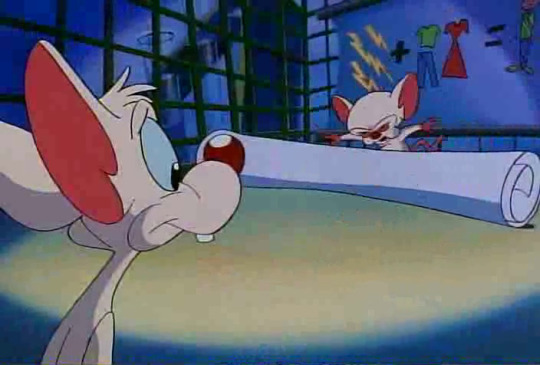
“to generate global static cling, we shall construct a massive clothes dryer.”
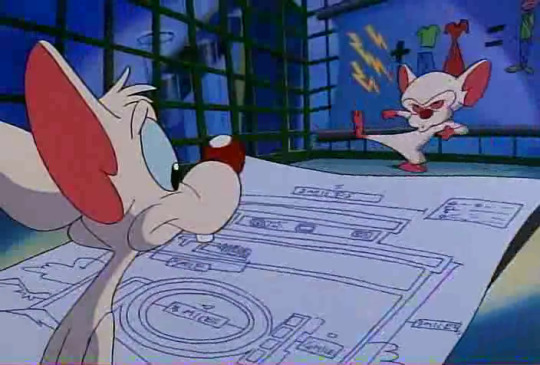
BEHOLD.

THE TITANOCYCLE FOUR THOUSAND, WITH THREE SPEEDS AND AUTOMATIC WRINKLEGUARD. this will surely allow brain to.... trap everyone in their clothes via static cling and. uh. allow him to seize power...... somehow......... by putting everyone in a really big tumbledryer?????

it costs fourteen billion dollars.
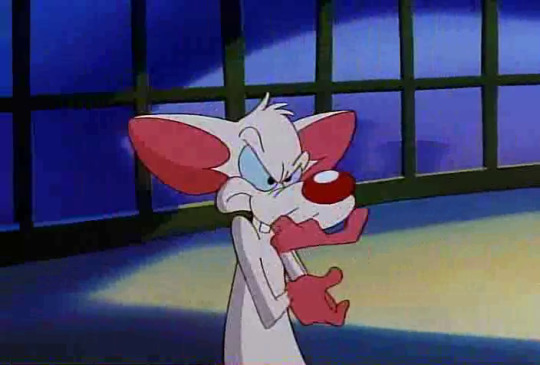
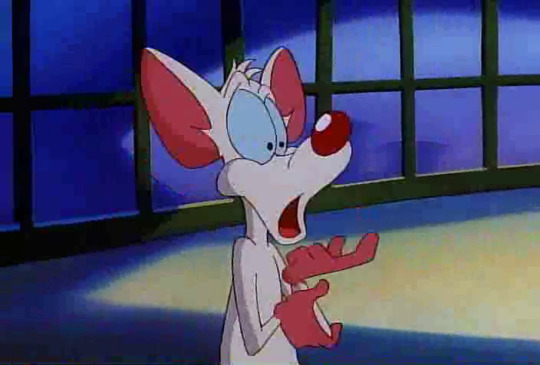
“oh, i have it!”

“we build a huge tooth, leave it under a huge pillow, and then fairies will leave us lots of money!”
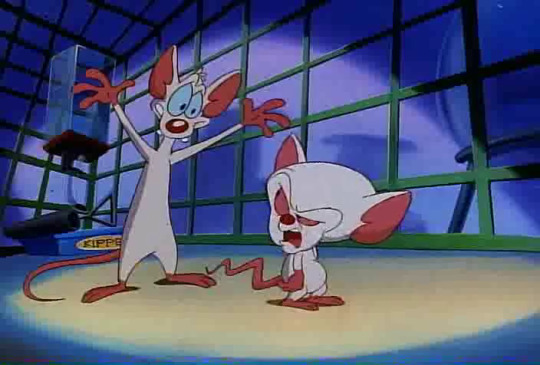
brain tells pinky to stop eating paint chips. it’s a well deserved response to pinky’s insane, bullshit idea, not nearly as dignified and scientific as Everyone Goes In The Big Tumbly Dryer By Brain Age Two And A Half.
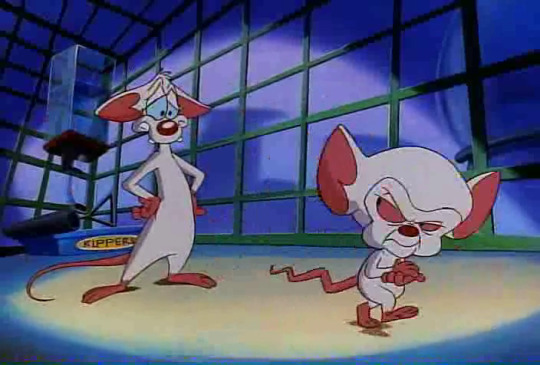
as he heads off to ponder an Equally Sensible idea to get a lot of money, pinky assures brain that he will not “be a bother.”
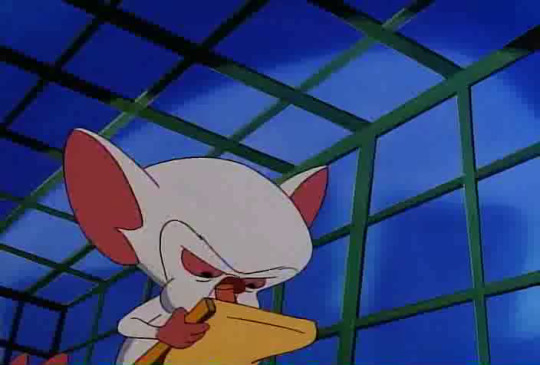
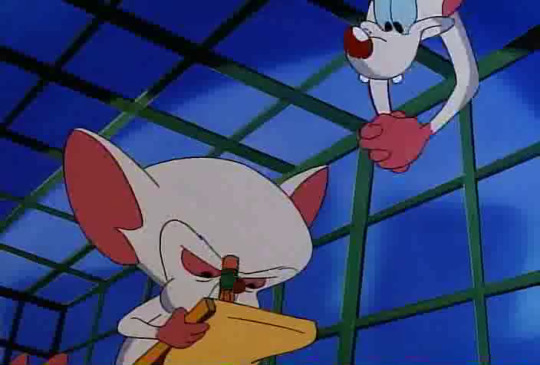
“brain.”
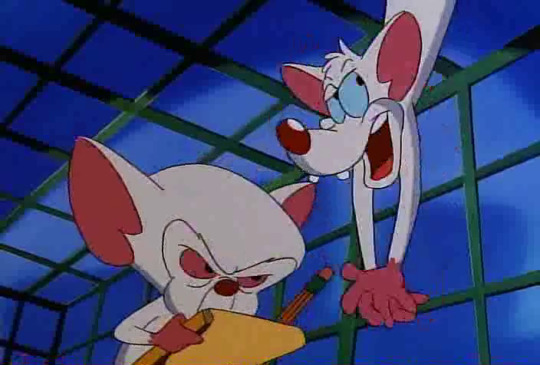
“if i ate a hundred jelly rolls, would i explode?”

i don’t know why pinky is sticking his ass out. maybe that’s where the jelly rolls go, in the sense that whenever i used to eat cakes around my dad he’d often say something like “a minute on the lips is a lifetime on the hips”. (also? pinky is british, so what he actually means is jelly rolls, and that sounds disgusting.)
so anyway brain gives him a piece of paper and tells him to try origami.
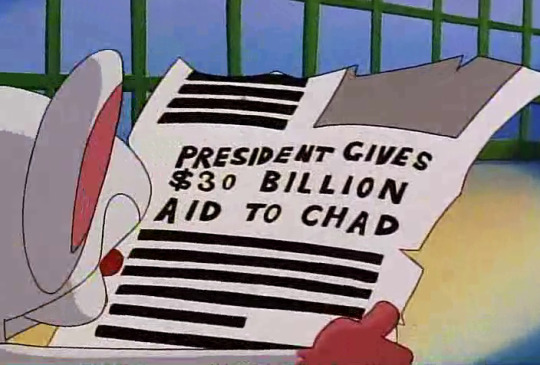
BUT WAIT.

“pinky! are you pondering what i’m pondering?” “i think so brain, but why the bitch stacey foreign aid office is giving chad all the money while i’ve always been a nice guy and showed her a basic level of human respect is beyond me. narf.”
no i’m sorry. he didn’t say that. pinky respects women. also apologies to the residents of the actual country of chad. big ups to all of you. lol. (he actually says “but pantyhose are so uncomfortable in the summertime”, which is wild, considering this episode was aired in november.)
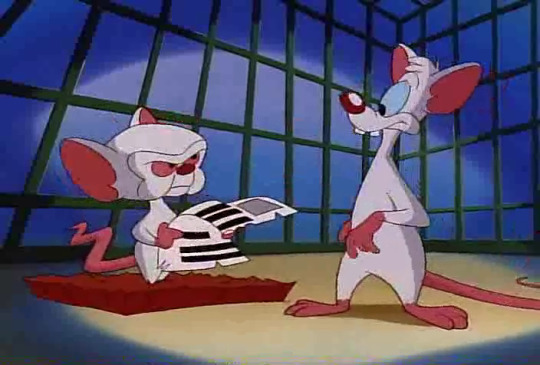
brain doesn’t want to wear the pantyhose.
well, maybe he does, but not right now. instead, he suggests that they form a bogus nation and demand reparations from the united states, which is, of course, easier, saner, and far less work than Really Big Tooth. as he folds the Chad Newspaper into a vague key shape (the Virgin Tabloid never had a chance) pinky points out that, uh

you can’t just invent a country, brain. “won’t people know we’re not a real country?”
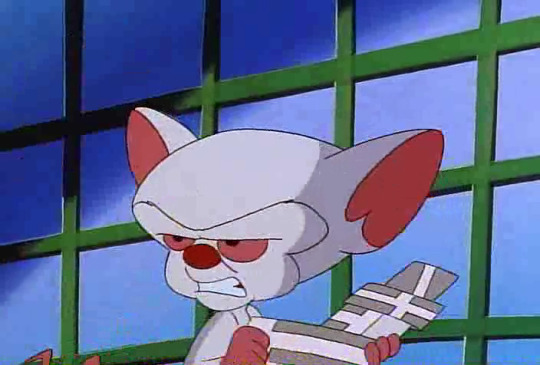
“the average american’s grasp of geography is pitiful. they’ll think we’re part of the former soviet union.”
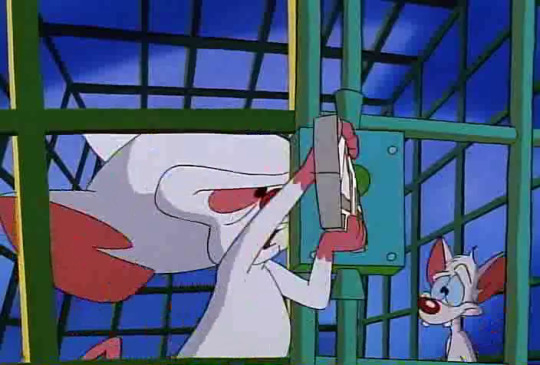
“or canada.”

so they pick a random, tiny island on the label of a Science Chemical and set off on the boat to Being A Coloniser Town.

a long sea voyage awaits us! and at the end, we shall found a nation! and that nation shall be called!
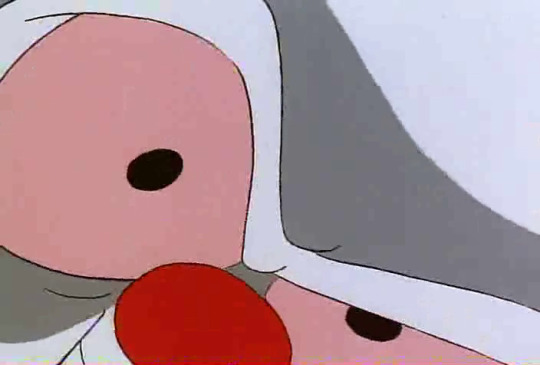
BRAINANIA.
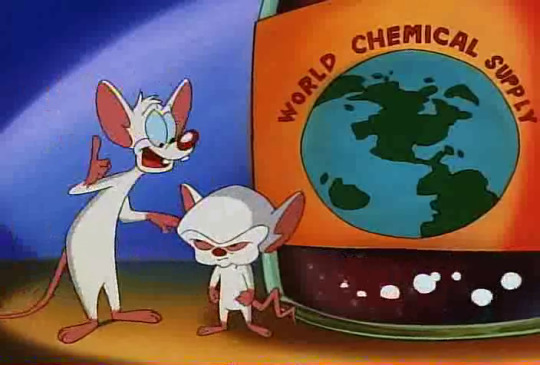
“can’t we call it pinkyland? or eric?”
“don’t vex me, pinky, or i shall turn on you.”

so they get on the S.S FATTY LUMPKIN and bugger off to Island X.
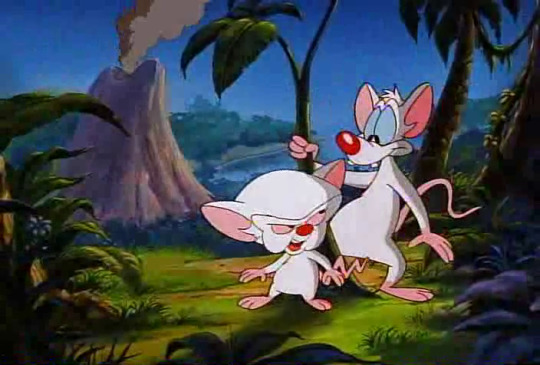
“i haven’t seen anybody yet, brain. i guess we’re alone here.”
“excellent, pinky. it’s time to flesh out the terrain.”
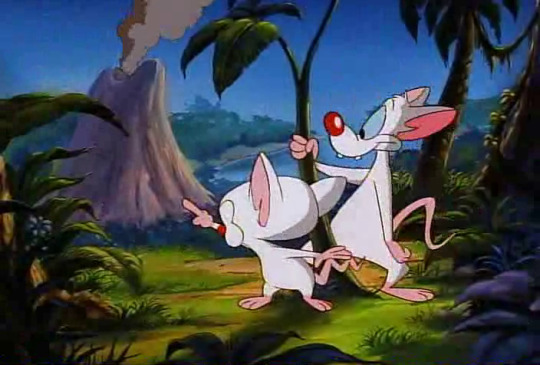
“that volcano will be mount brain.”*

“this clearing will be brain flats,”
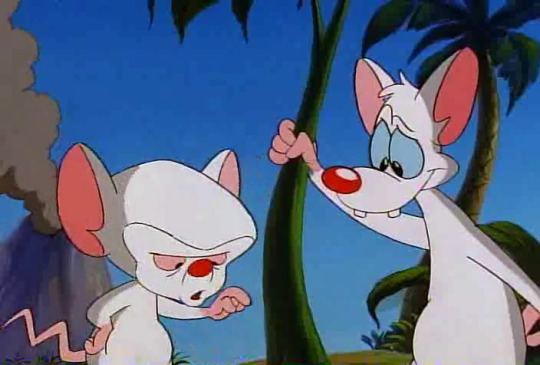
“and that water over there--”

“very well.”
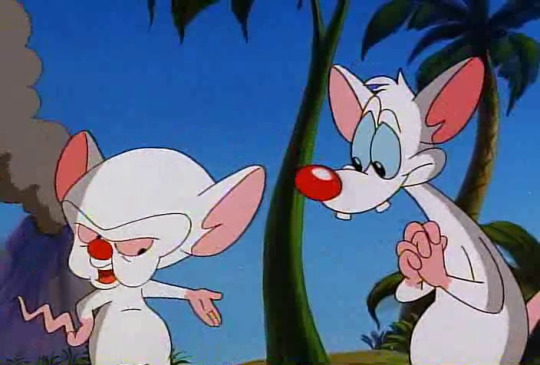
“the fjord of pinky.”

and they hoist their adorable, homemade flag, while pinky doots them a little themetune.
(*perhaps when they’re not in the middle of the jungle.)

how lovely!

less lovely.
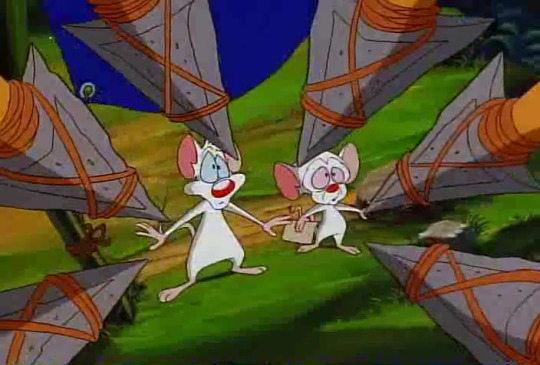
significantly less lovely. still, it got brain to make the little O:O face, so it’s not all bad.
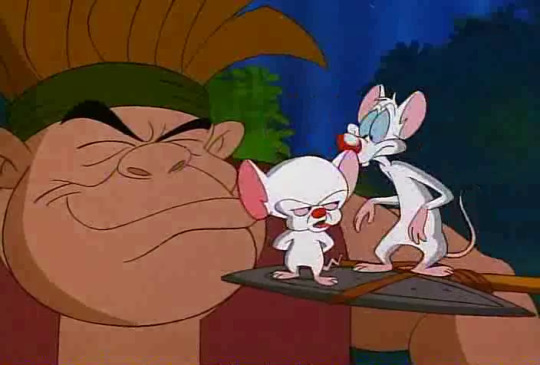
as the mice are scooped up onto a sphere and presented in front of this presumably-maori gentleman, brain decides to put his White Gay From Los Angeles skills to the test, and reassures pinky that he will communicate with them in the Primitive Argot Of The South Seas.

ME NUMBER ONE FELLA. OTHER FELLA NUMBER TEN. CATCHY ALL SAME SAME. YOU SAVVY?
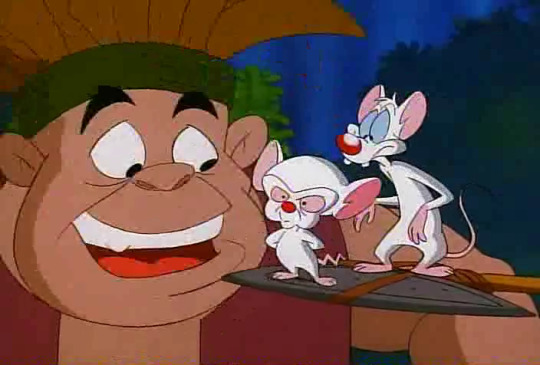
“good day, mate. d’you speak english?”
hmmmmmmmmmmmmmmmmmmmmmmmm.
anyway apparently this has happened often enough that these guys learnt english. from all the times it happened. and then they ate the guy they learnt english from and shrunk his head, but to be honest, i don’t blame them.
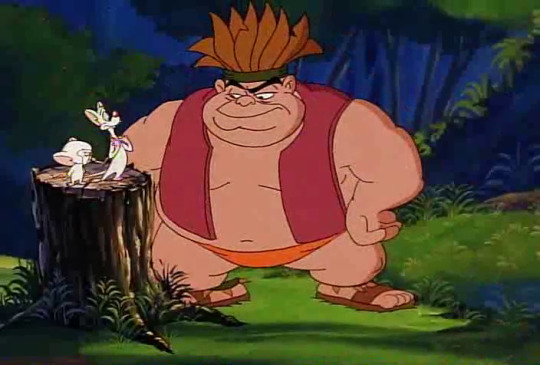
this is alan. “hello, alan.” says pinky.
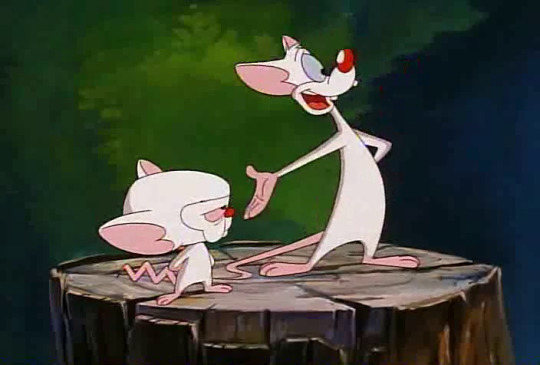
“i would be pinky! and this is prime minister brain.”
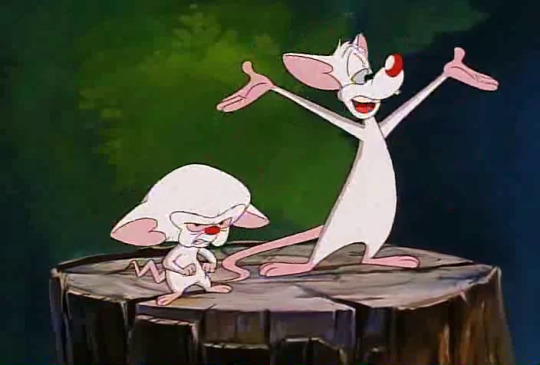
“who is IN CHARGE OF THIS ISLAND AND EVERYTHING YOU SEEEE.”
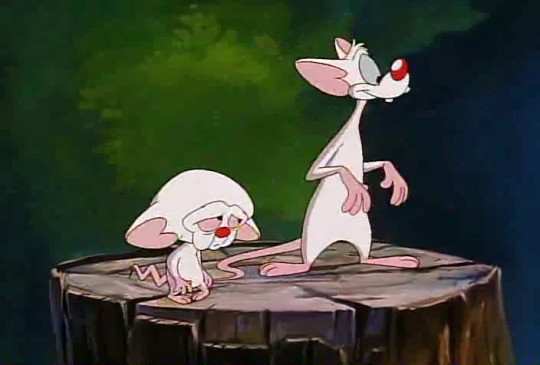
“narf.”
sneaky bastard knows what he’s doing.

alan isn’t too happy with that, because the island belongs to the volcano god, whanganui,
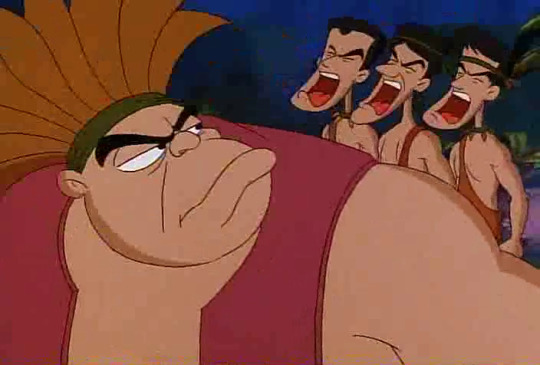
WHO PROTECTS US FROM EVIL AND HAAARM AND WHAT ALL ELSE.
(i can find no evidence that whanganui is actually a god, as opposed to just A Bit Of New Zealand. if they are, i’m more than happy to go back and edit this as would be religiously considerate.)
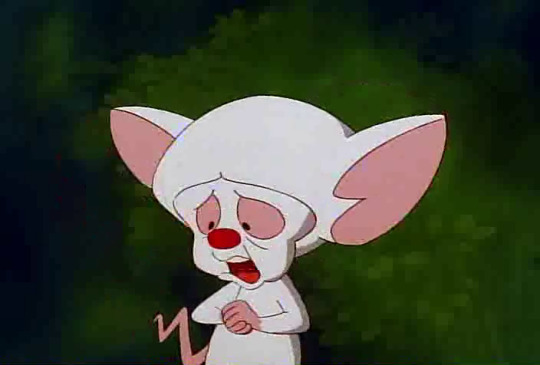
this is the face of a man who knows he has fucked up.
still, brain decides yet again that his pride comes before any kind of rational decision, so he decides to tell them that whanganui sent him to the island to rule over them,

as proven by his fire powers.
(ETA: i missed this last time. why is brain carrying a lighter around? that episode isn’t for a good few more seasons yet.)

alan is unimpressed.
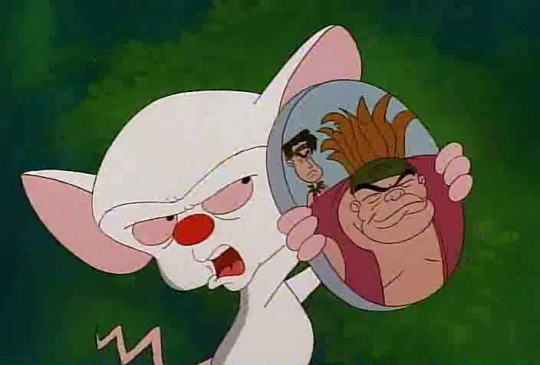
I CAN TRAP YOUR SOULS INSIDE THIS GLASS

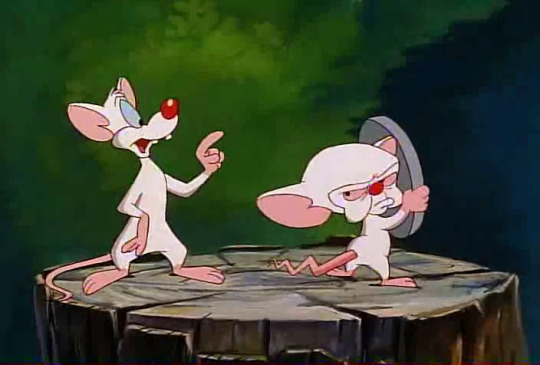
“i can make bubbles with my spit!”

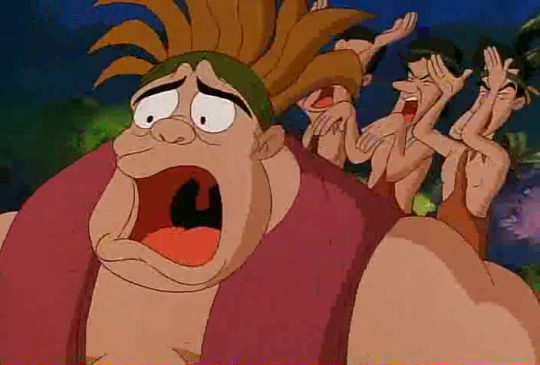
apparently this is a real talent on the island. who’d have thought. (they do not believe it to be a sign of god. it’s just really cool.)
so brain gets a hand building brainania.
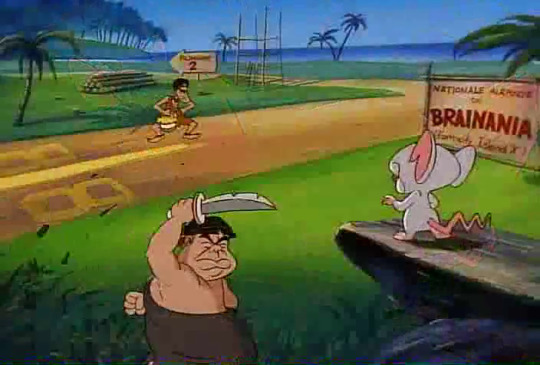
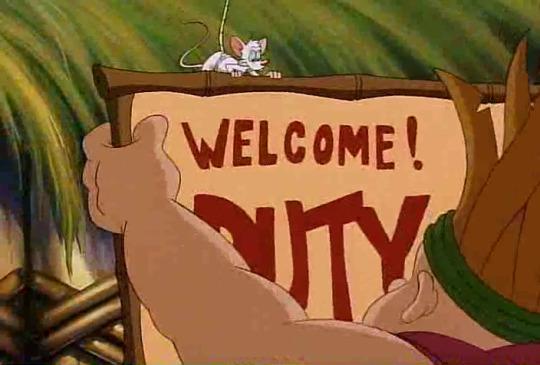

it has everything one could possibly need.
actually pretty much as soon as the airport and the gift shop are built, brain heads to washington, so evidently he holds the strong opinion that this is everything a country could possibly need. odd. still, maybe he plans on adding stuff once he becomes world ruler, or whatever.

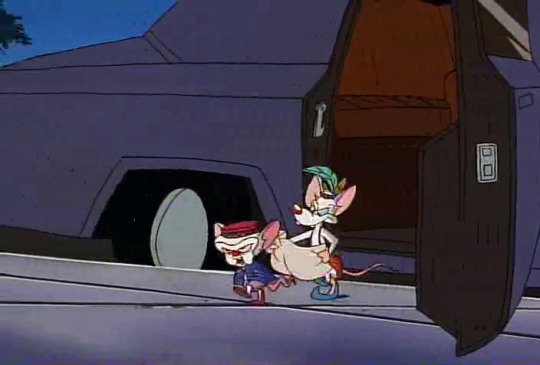
so with that established, The Most Exalted ned limpopo gets out of the car. hassan lembeck is also here. he is attempting to make an origami bird out of a newspaper.


no bird for you, mr lembeck. no bird for you.
they wander off to go and see mr bisck, who is currently playing with a little toy plane.

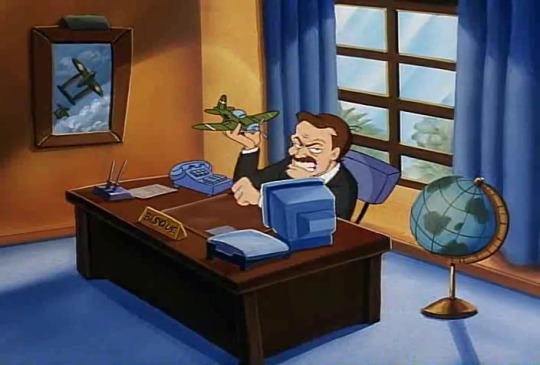
he reacts to the news that the prime minister of brainania is here to see him with “oh great, more moochers,”
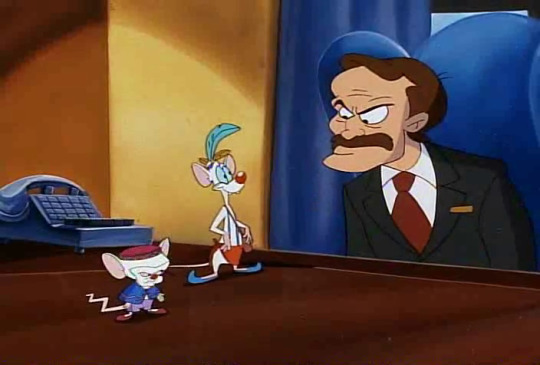
and does not seem to take kindly to having tiny mice on his desk, even if they are reasonably exalted.
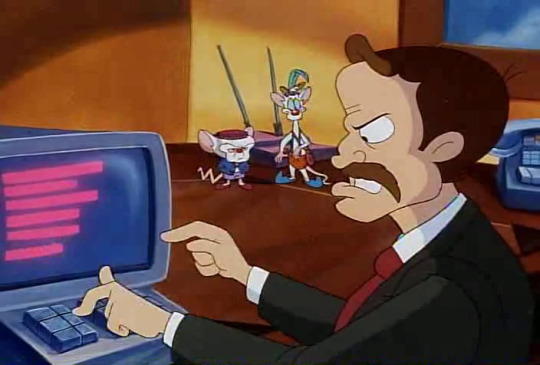
though a quick database search tells him said mice have no record of financial trouble, or, indeed, a credit rating, so. he tells them to go away.
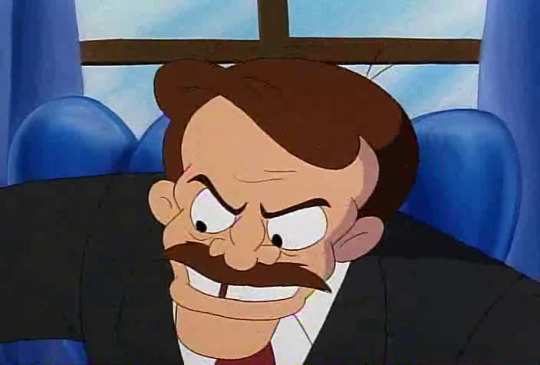
“go away.”
okay. hassan doesn’t take this well.
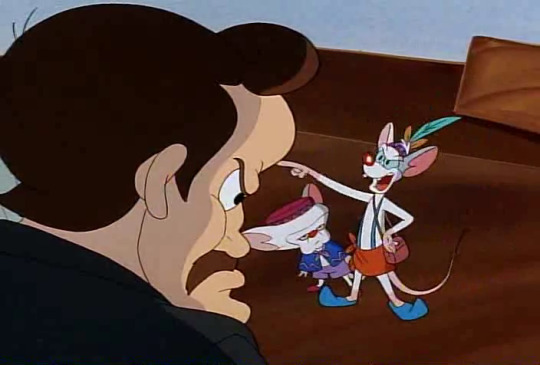
as Exalted Ned Limpopo gently tries to persuade mr bisck that he could “harm negotations” between brainania and the us (a lot more politely than he usually explains things to people, may i add) hassan chimes in with a haven’t you people ever heard of bold claim that brainania, if slighted, will INVADE YOUR LANDS

GO BOOM BOOM BOOM

AND MAKE YOU ALL OUR PATHETIC SLAAAAAAAAAAAAVES.
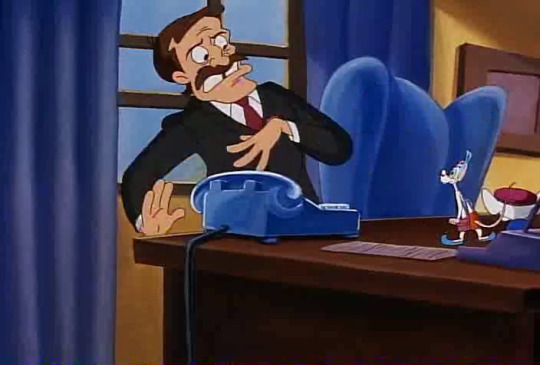
mr bisck does not like this idea, it seems.
as he rushes off to tell the UN, brain informs pinky that he has

“just created an international incident.”
“oh, thank you, brain.”
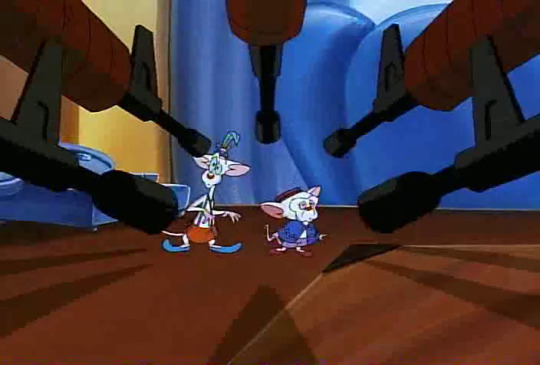
“in the words of the immortal yogi bear, this is dejavu all over again.”
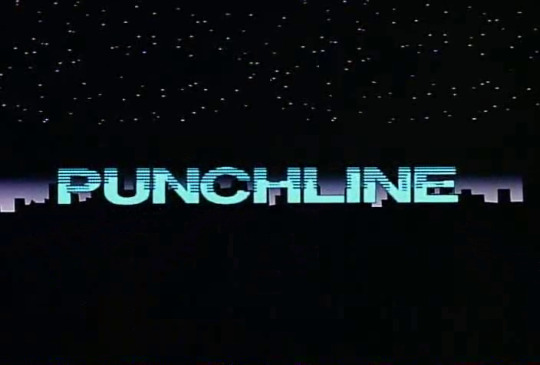
so the boys turn up on PUNCHLINE, WITH FRED FLUBBLE.
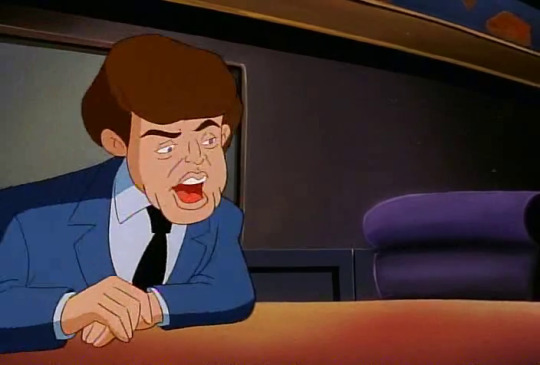
there he is. “perhaps you gentlemen would care to climb up on the desk?”

they make it, just about.

and sing a fun little song about brainania’s war victories, i guess.
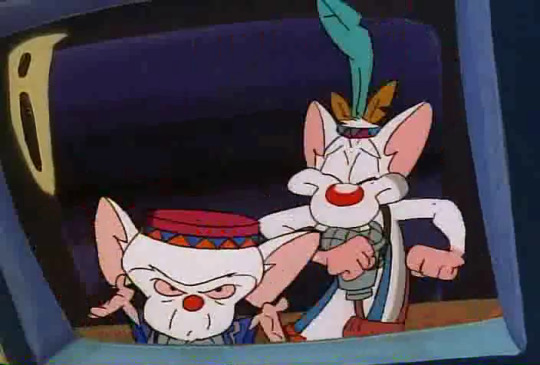
WE WILL FIGHT AND NEVER QUIT
FIND ME A ROOFTOP AND I WILL SPIT. NARF
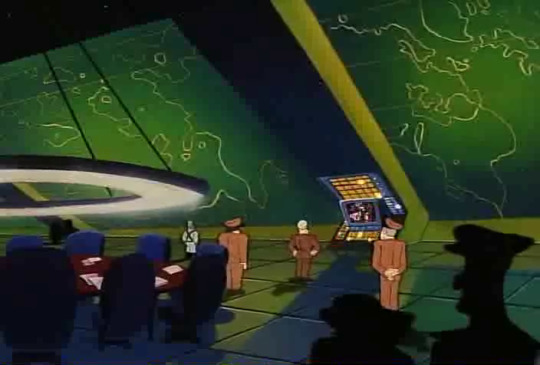
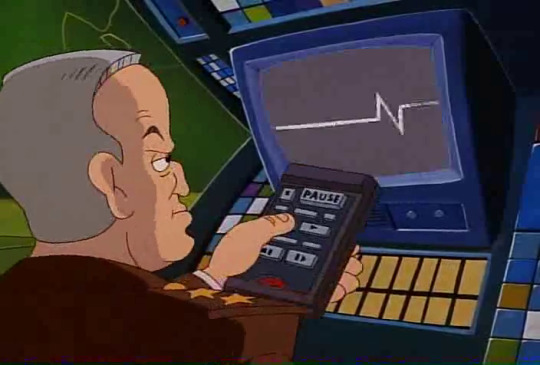
this is not well recieved by the us military.

unfortunately, as the US press secretary points out, the us cannot go to war with a country it can’t find,
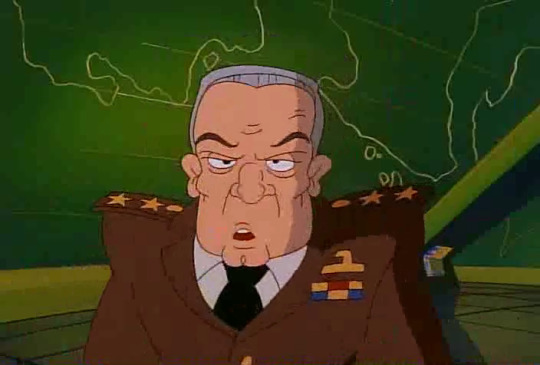
(wuss.)

so instead the mice are invited to dinner at the white house.

“in a few short hours, pinky, we shall have our foreign aid loan, and then the world!”
“birdy birdy birdy! narf!”
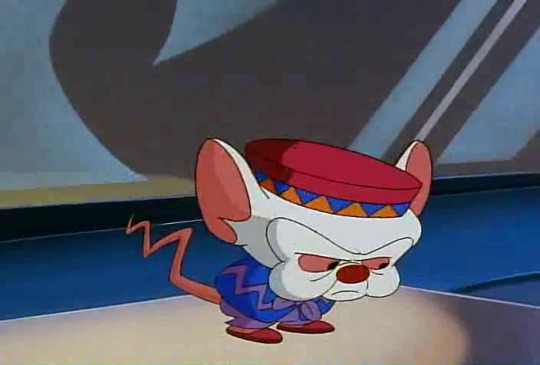
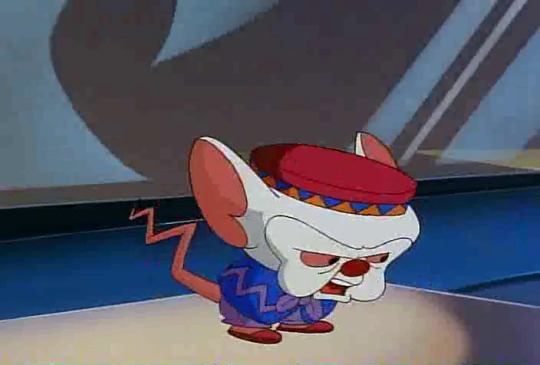
“i sense much of this historic moment is lost on you.”

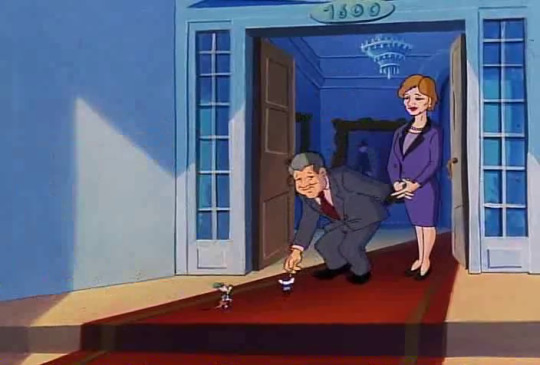
at the white house, a very bored looking individual introduces The Most Exalted Ned Limpopo (feat. hassan lembeck), and bill clinton shakes his hand.
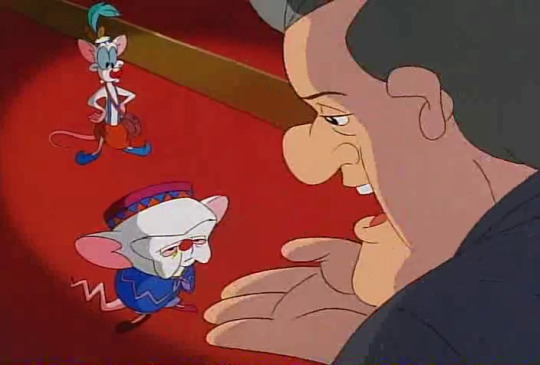
“me number one fella. other fellas number ten. catchy all same same. you savvy?”
“i speak fluent english.”
“eyyyy. haha. sure you do.”
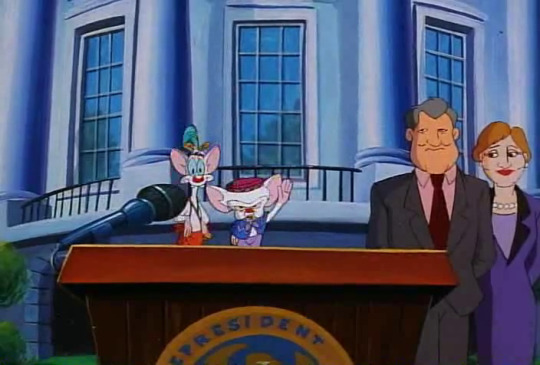
“all brainania ever wanted from the US was friendship. friendship, and fourteen billion dollars and fifty nine cents. the friendship i will treasure. the money i will spend on polo ponies and cruise missiles.”
brain has a brief discussion with hilary clinton over the advantages of strontium ninety versus uranium two-thirty-eight,
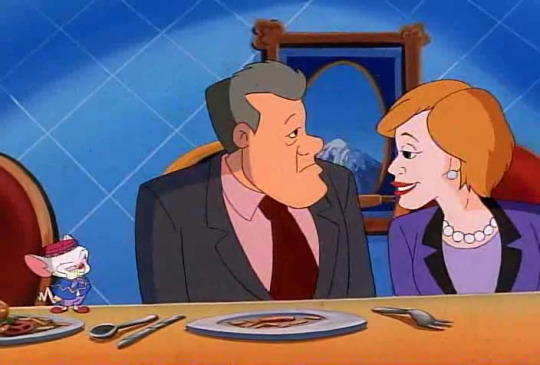
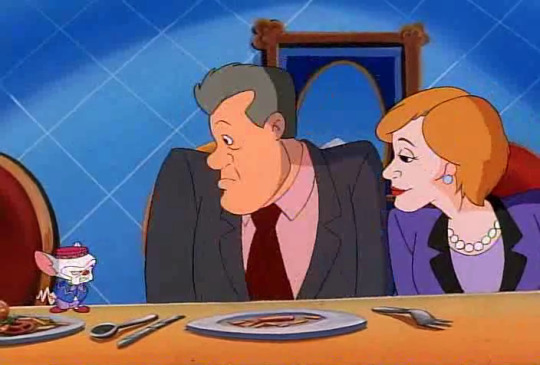

bill clinton pulls this face and tells them it Sounds Smart,
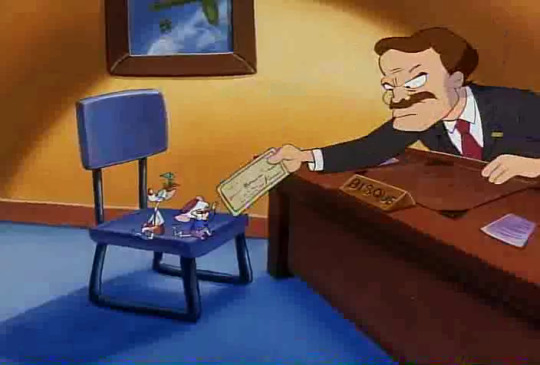
and the mice bounce merrily back to mr bisck to get their foreign aid check.
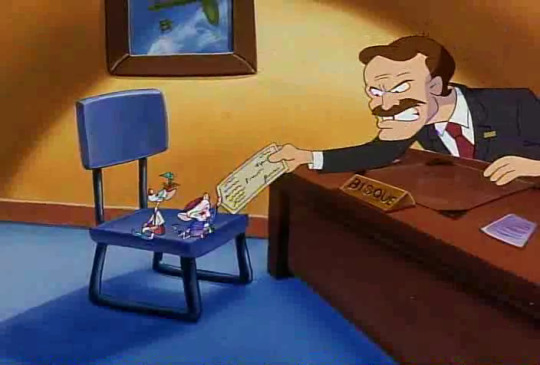
“you better not lose it, buster!!! i just erased your records!! you won’t get another one from me!!!!”
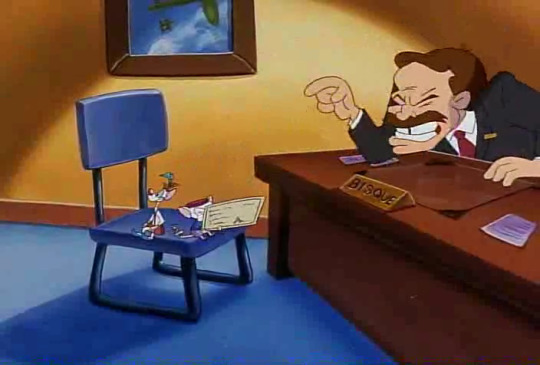
HA.
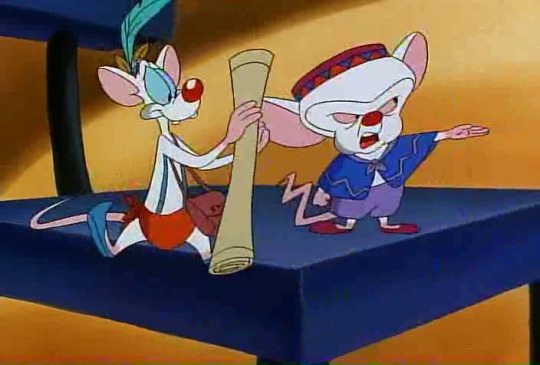
“one should be enough. thanks and farewell, “

“you niggling bureaucrat.”
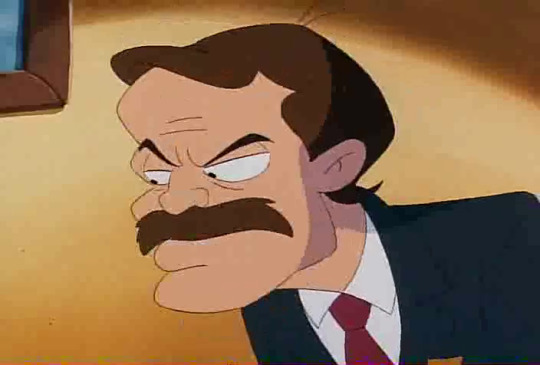
conclusion:

upon returning back to brainania, The Most Exalted Ned Limpopo finds a letter from alan addressed to him. it’s also mouse sized, which is adorable. apparently, whanganui,
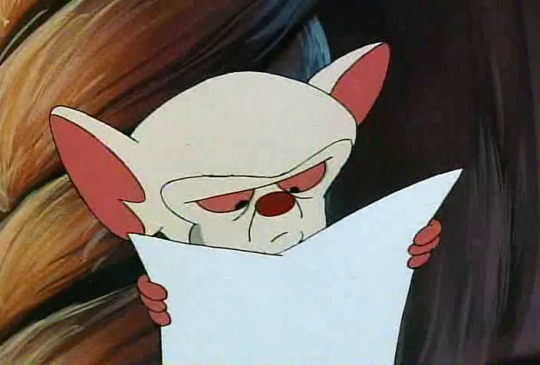
WHO PROTECTS US FROM EVIL AND WHAT ALL ELSE

is “blinking mad”, and the volcano is going to explode.
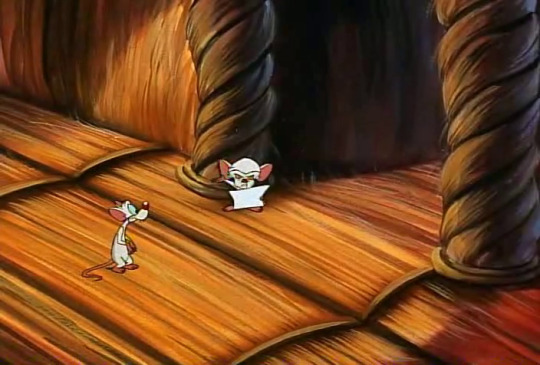
brain, obviously, does not believe in whanganui, and is mostly just mad that he’s lost his workforce. still, as pinky points out,

“at least we've still got brainania!”
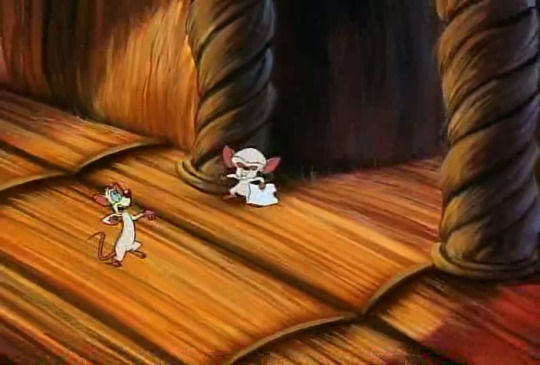
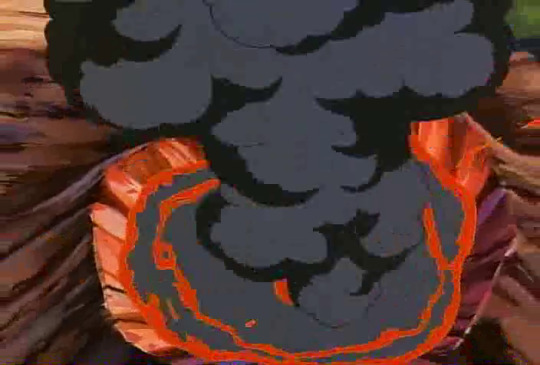

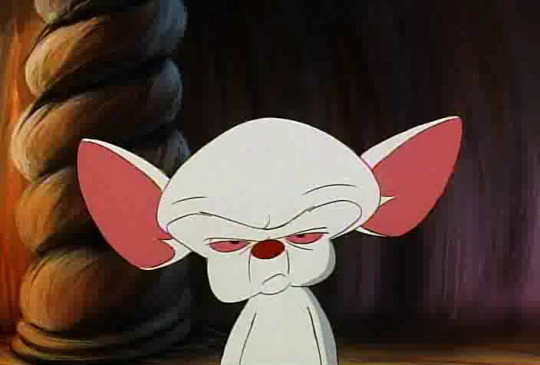
“i sense life has taken another sardonic twist.”
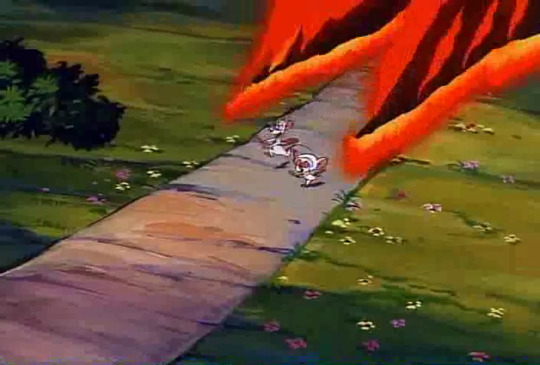
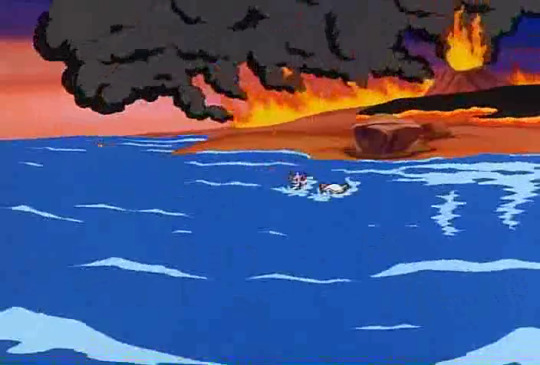
still, they do, barely, have enough time to reach the shoreline and start swimming away from the imminently exploding volcano. perhaps it should have been, yknow, a pretty decent sign that the natives cleared out. historically, people who live in these places tend to know about them, but what of that when brain is number one guy same same you savvy.
🙄
anyway the karmatic response to all of that previous racism is that a tidal wave sweeps them back onto the volcano,


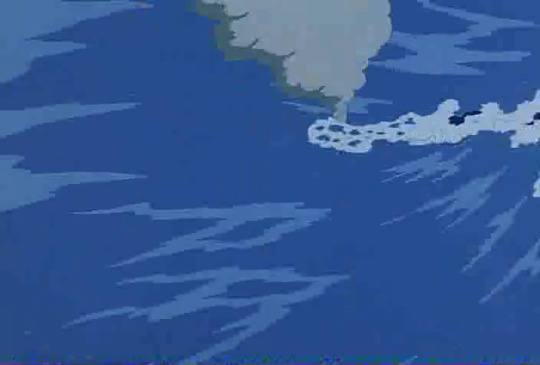
which then blasts them into space.


(okay not literally space. but they do end up on a little raft in the middle of the ocean. don’t ask me where the raft came from. i have no idea.)

oof.
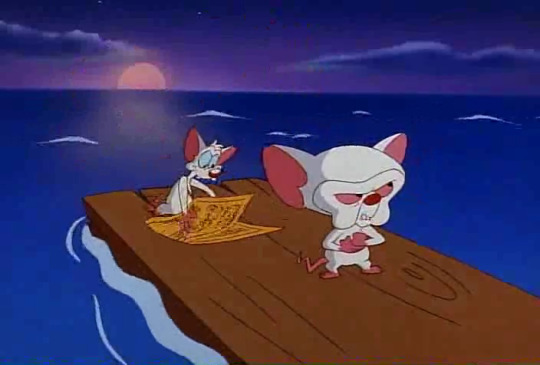
“mother nature has slammed her unmerciful fist on our fair isle, pinky.”
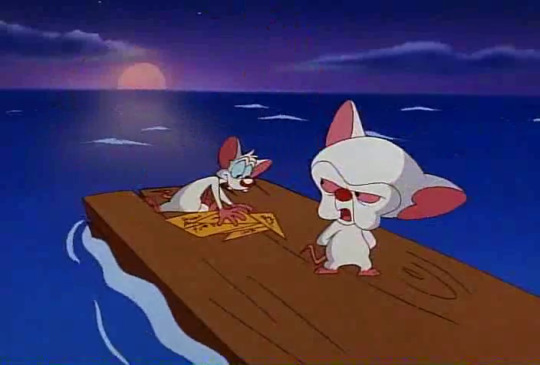
“do you know what this means?”
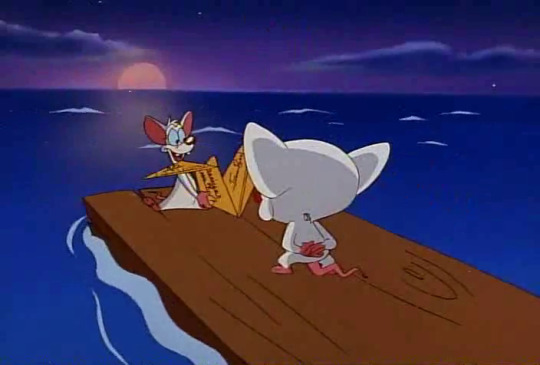
“birdy birdy birdy!!!!”
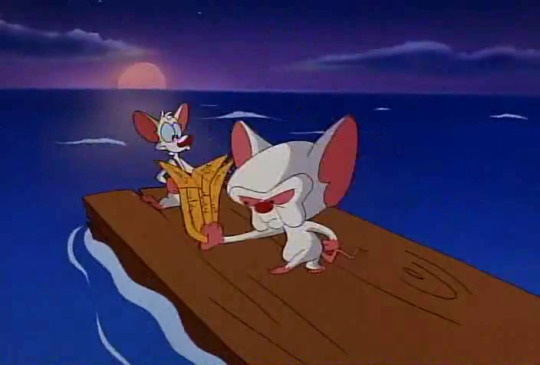
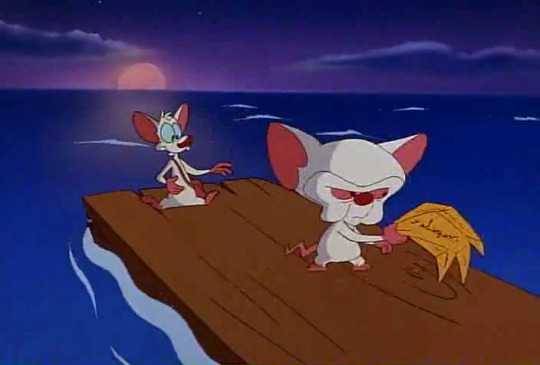
brain does not appreciate Birdy Birdy Birdy.

“blast it, pinky!”
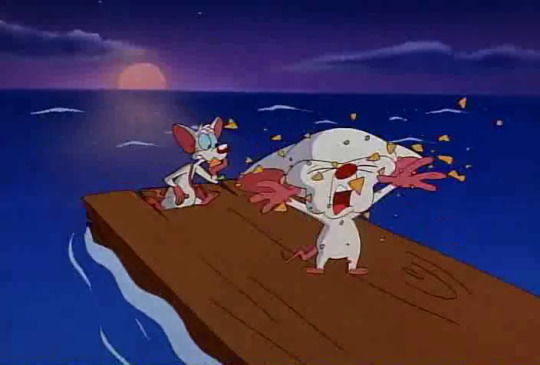
“i said, do you know what this means!!”

“it means you just ripped up our foreign aid cheque.”


one should be enough, huh?
brain: 7
pinky: 7
outside influence: 13
like, i don’t know. maybe pinky shouldn’t have been making oragami birds out of the foreign aid cheque. but, while silly, it’s not like it did any harm. brain.... brain just needs to chill.
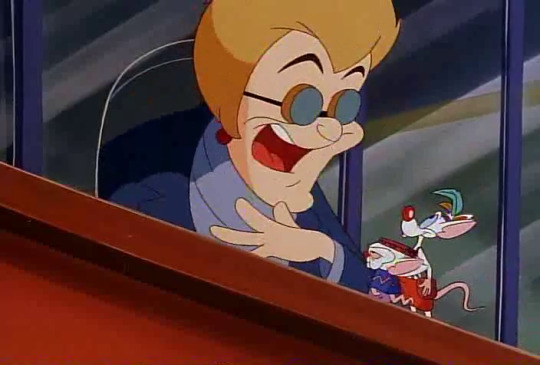
“well, aren’t you the tiniest foreigners i’ve had in here all morning. i’m mr appleby, can i help you?”

“yes. we would like to have relations with you. and steal some milk duds.”
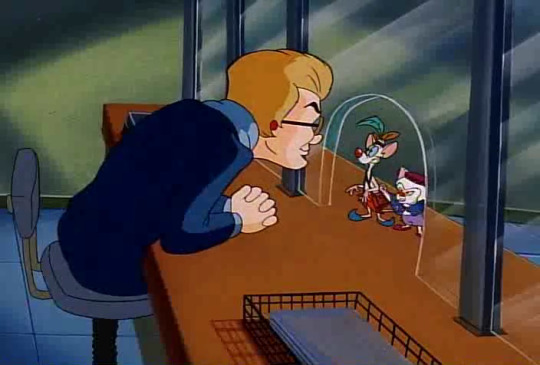
“we wish to establish diplomatic relations with the us. i am the prime minister, and this is my minister of finance.”
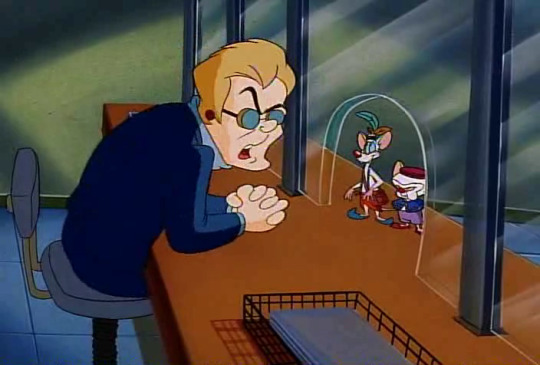
“brainania--? oh, i remember you. you used to be a.... suburb of prague.”
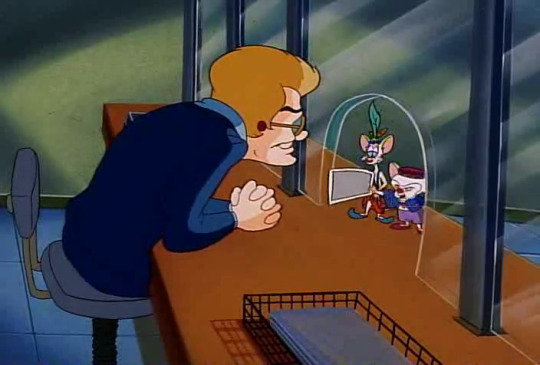
“can you prove you’re a nation?”
“yes! we have postcards.”
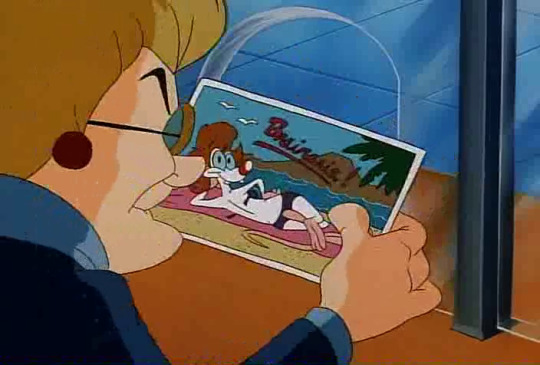

“that’s the fjord of pinky.”
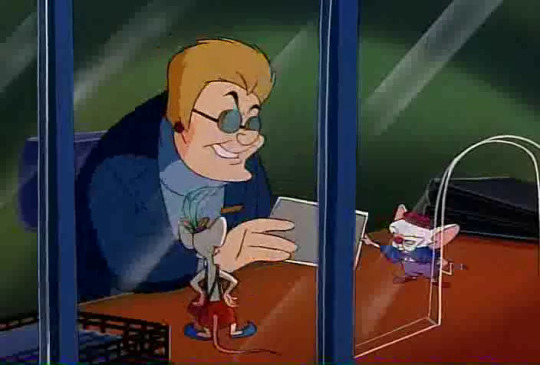
“you foreign folk sure have your own.... queer little ways.”
#patb#pinky and the brain#i did not like this episose much but. i suppose it was like thirty years ago#bizarrely it's actually more respectful to the natives than a lot of cartoons at the time were which is#even worse actually.
30 notes
·
View notes
Note
hi I hope I’m not bothering you but!! I’ve been listening to chess (the original recording w murray head and elaine paige) and I really like it!! I’ve listened to the whole thing a few times but I can’t quite get a grasp on the plot, and google isn’t helping haha. can you please give a summary, maybe song by song or something? only if you want to tho!! feel free to ignore this no worries! I just thought I’d ask you cause you’re the chess mutual TM :]
THIS TURNED OUT SUPER SUPER LONG IM SOOO SORRY
YES YES YES IM THE CHESS MUTUAL >:D asking me about chess makes me POWERFUL!! you’re not bothering me at ALL. the plot varies from production to production, thank you for specifying which one you’re listening to! i’ll give a song by song summary as best i can but know that i have the reading comprehension of a slice of cheese
i’ll be referring to the main characters as “the russian” and “the american” bc thats what the original album does ^_^
merano — opening number, not super plot relevant. the citizens of merano, italy are all happy that their town is the setting of the chess championship. in the middle of the song the american chess champion shows up and sings about what a good chess player he is.
the russian and molokov — introduces, well, the russian challenger, and his second, molokov. this is just a little conversation between them about the american. it makes more sense if you listen to “press conference”, which is a bonus track on the original album, where the american throws a fit and assaults a reporter. but basically molokov is like “see? this dude is fucked” and the russian is like Doubt, and it turns into a conversation about the championship as a whole: molokov views it as a way for the soviet union to assert its dominance over the usa, and the russian is like dude i’m a chess player not a politician
where i want to be — the russian’s first solo number. he reflects on his life in general and how he’s technically gotten everything he ever wanted, but it’s all empty victories. he’s fully aware of his status as a pawn to the ussr.
opening ceremony — a lot happens in this one, and it’s split up into separate tracks in most albums. “the arbiter” introduces the arbiter who’ll be presiding over the matches and ruling the chessboard with an iron fist. “difficult and dangerous times” is a song that i think perfectly encapsulates the spirit of the whole musical: it’s just a game, sure, but neither country wants to be the one that couldn’t even win a game. “the merchandisers” doesn’t move the plot at all but it serves as a little jab at capitalism i guess? basically its just a bunch of people trying to make money off the game. “hymn to chess” is just a little hymn to chess, i guess. sort of like how they always sing the national anthem before a sporting match?
quartet (a model of decorum and tranquility) — between the last song and this one, the first match started, but it never finished, because the american flipped the board and stormed out. this song shows the russian, molokov, the arbiter, and the american’s second florence bickering about what the hell just happened. also the russian calls the american a fruit which isn’t super important but like
the american and florence — florence confronts the american about his behavior. in an incredibly dickish move if i may say, the american turns the conversation to florence’s dead father: “well the ussr killed your dad, didnt they? and i’m against the ussr in this chess match. so by opposing me youre really betraying your dead dad.”
nobody’s side — florence’s first solo number. she reflects on her relationship with the american (which is strictly professional in some productions and explicitly romantic in others; it varies) and how she can’t justify the way he treats her. she comes to the conclusion that she can’t trust him or really anyone; she’s looking out for florence first and foremost.
chess — instrumental :) this tune comes up whenever a chess game is played. over the span of this instrumental break the russian gains a lead of five games to one, which is bad news for the american because the first man to six wins claims the championship.
mountain duet — florence arranges a meeting between herself and both the players, but the american is running late. alone with just the russian, the two of them realize and accept that they have feelings for each other. in a scene that doesn’t appear in this album, the american finally shows up and is naturally very pissed
florence quits — exactly what it says on the tin; florence quits working for the american. the american is obviously mad about this, and is sexist at her for two minutes and 56 seconds
embassy lament — the american has resigned, making the russian world champion. he immediately defects from the ussr to england, with florence. this song is just the consul officers at the embassy being difficult little shits
anthem — the russian explains how “his land’s only borders lie around his heart” and even as he leaves the soviet union he’s still very proudly russian. this ends the first act.
bangkok / one night in bangkok — one year has passed. the next championship is to be held in bangkok, thailand. the american may not be in the game anymore, but he’s employed by global television to report on the championship. this song isn’t super plot relevant but lord if it isn’t catchy.. basically he just shows up in bangkok and rejects all the exciting nightlife in favor of chess. (some productions play the lyrics as sarcasm, with the american enthusiastically having sex with random people and doing coke n shit while claiming his every move’s among the purest)
heaven help my heart — florence reflects on her relationship wifh the russian. she’s afraid of what’s going to happen once the infatuation ends and she’s not something new and exciting for him to play with.
argument — oh, did i mention the russian left a wife in the ussr? cause he left a wife in the ussr. molokov is bringing her out to bangkok. florence is very distressed about all this and the russian is like “the soviet union has played me like a fiddle all my life this is obviously just a trick to mess with me. no biggie. stop worrying. shut up”
i know him so well — a duet between florence and the russian’s wife. the two of them sing about both of their failed relationships with the russian, and how now they know him well enough to know both their relationships were doomed from the start.
the deal (no deal) — molokov wants the russian to throw the match to prove a point about the challenger, a loyal soviet, being a better player than the defecting traitor. so he dangles florence’s father in front of him and says he was alive the whole time in prison, lose the game and i’ll let him out! but he doesn’t say this to him directly, he has the american deliver the message to both the russian and to florence. (in later productions molokov’s character is split into both him and an american, walter de courcey, who’s the one to push the american into this. i think it makes more sense that way, personally.)
pity the child — the american looks at his childhood, and how much of his assholery is due to mommy issues. he finally gets some depth to his character after being a hate sink for an act and a half
endgame — it’s the final match between the russian and the soviet challenger. it’s unclear how much of this song is actually happening and how much of it just represents what’s going on in the russian’s head. but ultimately, he decides that he’s not going to be a pawn to the ussr anymore, so he’s going to win the game. screw florence, screw his wife, he’s doing what he wants.
epilogue: you and i / the story of chess — the russian and florence look back on their relationship. did florence get reunited with her father or was molokov lying, you ask? the concept album leaves it ambiguous. oh yeah and then it ends with an ahistorical tale about the invention of chess
#THIS IS SOSOSOSOO LONG SORRY#LONG POST#VERY LONG POST#i can do a shorter summary and/or clarify anything from this
5 notes
·
View notes
Text
Best First Time Watches of April 2020
Casablanca (1942) (dir. Michael Curtiz) (USA)

Yes, this is really my first time seeing it. Yes, it's incredible. Yes, the lines in the context of the film became more and more heartbreaking. Yes, I nearly burst into tears at Rick and Ilse's flashbacks. Yes, Humphrey Bogart and Ingrid Bergman are two of the greatest actors of Hollywood's Golden Age.
Come and See (1985) (dir. Elem Klimov) (Soviet Union)

The most brutal and horrifying war film ever made. The sound editing and cinematography are borderline sickening at some points. Makes most other war films look like kid shit.
Goodbye, First Love (2011) (dir. Mia Hansen-Løve) (France)

One of the best films about heartbreak. It's honest about the feelings that come after failed romance, especially after the first person one falls in love with. It's never conclusive, and moments with a new partner can feel unsatisfactory. Depressing, wonderful movie.
The Hunger (1983) (dir. Tony Scott) (USA)

An erotic, visceral vampire film that starts off slow and seductive, and becomes a saddening film about aging, addiction, and wanting desperately to not be alone. The "Bela Lugosi's Dead" sequence is an all-timer. We miss you, Tony Scott.
The Lady Vanishes (1938) (dir. Alfred Hitchcock) (Britain)

Hilarious and fun mystery film concerning the disappearance of a lady on a train. Each character is memorable, and this is surprisingly one of Hitch's funniest films.
Near Dark (1987) (dir. Kathryn Bigelow) (USA)

A gory and beautifully shot vampire Western featuring some of the best music from Tangerine Dream. And Bill Paxton plays a jackass vampire. What the hell's not to love?
Pink Flamingos (1972) (dir. John Waters) (USA)

One of the most disgusting films ever made. Incest, shit-eating, and the works are in this. It's also one of the funniest and most daring in terms of its content and filmmaking. Waters is a fucking genius.
Southland Tales (2007) (dir. Richard Kelly) (USA)

Confusing? Yes. Weird and maybe a little too on the nose sometimes? Sure. But also one of the most interesting and honest looks at America post-9/11 and its blatant nationalism disguised as patriotism through war and media. Also hilarious as fuck.
Tomboy (2011) (dir. Cèline Sciamma) (France)

One of the most empathetic and accepting films about with gender non-conformity I've seen. Zoè Heràn's performance is immaculate, it shows so much range, anxiety, and happiness.
What's Up, Doc? (1973) (dir. Peter Bogdonavich) (USA)

This movie is hysterical. Every 30 seconds there was a joke that I couldn't stop laughing at. A caper, a screwball comedy, and an action film all at once, filled with incredible, side-splitting performances, some of the best set design of '70s cinema, and just pitch-perfect direction and blocking.
#these movies are (chef's kiss)#casablanca#come and see#goodbye first love#the hunger#the lady vanishes#near dark#pink flamingos#southland tales#tomboy#what's up doc?#movies
38 notes
·
View notes
Text
Covid 19 and the New Era
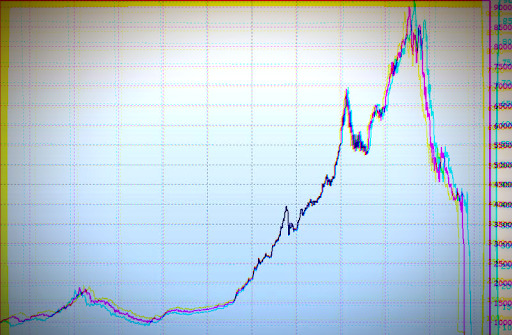
Initially published on the OA blog here.
Part 1: Goodbye to the end of History
31 years ago, US political writer Francis Fukuyama wrote an essay titled The end of history. In it, he summed up what many were feeling at the conclusion of the Cold War: without a grand historical conflict between world superpowers, what further challenges could there be to the system we live under today: capitalist liberal-democracy? In this essay, and his later books, he wrote that with the collapse of the Soviet Union, most world governments would shift towards a liberal democracy, with an emphasis on transnational government much like the European Union, and with this new epoch would come a period of unparalleled peace. Events might still occur, he said, but the overall trend of civilisation would be towards endless peace, endless profit, and endless technological advancement that would eventually lead to humans having control over their own evolution.
What Fukuyama might not have predicted is that his simple thesis would become one of the most criticised essays of all time. Barely had the ink dried on his paper when scores of writers poked holes in his analysis – something very easy to do, for Fukuyama wasn’t much of a philosopher, but rather a political hack who summed up the dominant view among liberal thinkers at the time. In this, he was wholly successful, but he also ended up being correct in ways his critics couldn’t have predicted.
The next 31 years of history were some of the most uneventful, in terms of real movement, of any decades that had passed before – sure, not all countries became liberal democracies, and sure, history continued to chew up innocent lives and spit them back out, and sure, a few terrorists showed up here and there – but it seemed that no single event could ever truly change things beyond occupying the evening news for a few weeks. We have just emerged from the one of the most viscerally boring periods in human history, at least for the more sheltered populations in the west, and it’s important to recognise this.
Fukuyama’s end of history was not a new thesis: as the postmodernist Jaques Derrida, was quick to point out, Fukuyama had simply regurgitated some of the most turgid liberal philosophies of the early Cold-War era; the idea that liberal-democracy had emerged victorious, and that socialism had been proved wrong once and for all through the many perceived failures of Soviet societies. All that had changed was that Fukuyama said it at the right time: it truly was the end, capitalism had found its perfect justification in neoliberalism, a set of ideologies based in the idea that capitalism was a perfect, trans-historical goal of humanity, that only needed to be sufficiently untethered from regulation and sufficiently protected by a growing military and police forces in order to function properly. In this proper version of capitalism, untethered from the need to legitimise itself in the face of opposing ideologies, there was no need for capitalist societies to change to face new threats, for what can challenge an ideology that is so totalising it can convince people that it’s the only thing that exists? The only thing that has ever existed. A universal default.
In that sense, Fukuyama was perfectly right. History did grind to a halt for three decades. Not just the history of those decades, but all history, for every society throughout history could be painted as nothing but a stepping stone to this universal conclusion. There was no challenge to neoliberalism in that time, no great ideological foe to defeat, no workers’ movement to crush, and the best that the neoliberal states could offer up as some immense civilisational enemy was a pitiful force of Wahhabi terrorists – a by-product of the previous era, and therefore hardly a new historical agent. All that was left for the world to do was to reckon with the leftovers of the Cold-War period (the Wahhabis, remnant socialist societies, and shrinking unions), products of the last true period of historical movement, and wait for whatever technological innovation that would come next and inject some feeling of forward momentum into an otherwise stagnant society.
In time, even technology failed to deliver a feeling of progress. Each new technology of the period wasn’t truly new: all that capitalism could deliver was slightly faster and more powerful versions of technologies based in the previous era of major public scientific investments. Internet, wi-fi, cell phones, miniaturised processors, satellite communications – every single one of these technologies was a product of Cold-War era military or public scientific investment, albeit with a better marketing team. It is almost as if capitalists could produce no new innovation whatsoever, other than a faster, slimmer version of existing tech, that broke more often.
In this sense, one of the two defining features of the past 30 years that gave life a sense of movement and progress, communications technology, proved to be nothing but a latent product of the previous era, that came up against a wall as soon as the legacy technologies it relied upon reached the limits of exploitability. The same would soon be proven true of the other great symbol of neoliberal progress: economic growth.
Since the beginning of the end of history, economic growth has skyrocketed. Only part of this was due to imperialism – the ability for strong states with financial capital to spare to offload their surpluses onto the global south. That would have been a source of actual value were it the primary cause of this continuous economic boom, since it would have meant greater exploitation of labour. Instead capitalism developed along the much easier route – pure speculation in financial markets and tech companies, both of which are largely phantasmal.
Capital was creating a bubble – not of any one market, such as the late 90s tech bubble or the late 2000s housing bubble, but rather it was making a bubble out of capitalism as a whole. Who could have guessed what would pop it?
Part 2: What the fuck is going on?
Sometime around December 1, 2019, a few people got sick in the Chinese city of Wuhan. Many writers have spent thousands of hours speculating about the potential causes of transmission. Was it from a shopper at the Huanan Seafood Wholesale Market? Did the disease come from the actual produce at this market? Was it a bioweapon? Was it a bat? A Pangolin? Was everyone at the market just too weird and Chinese to not get the disease? What comparatively few news sites have focused on was how on earth a virus could cause an economic crisis so great that we have nothing to truly compare it to.
This is because it could have been anything. It could have been a completely different virus in a completely different country, it could have been a sudden war erupting, it could have been a plane crash, it could have been a Wall Street Executive slipping on a banana peel. The system of global financial markets had been systematically hollowed out and prepared in every possible way to collapse at the drop of a hat sooner or later. To understand how, we need to understand three things: the underlying philosophy of neoliberalism, the way a modern financial market operates, and the general theory of economic crisis put forward by Karl Marx in his unfinished third volume of Capital.
Under neoliberalism, austerity is everything. The existence of everything, often including human life, has to be justified in terms of cost-effectiveness, self-reliance, and interoperability with the rest of the system. This is why social welfare, such as Work & Income New Zealand, operates by giving the absolute bare minimum to beneficiaries, and why all government departments, with the exclusion of Defence, Police, and Corrections, have to operate on paper-thin budgets, constantly needing to justify any expenditure whatsoever in terms of net-benefits to the economy. It is also not a rational ideology, in that in pursuing its goals of profitability and lean government, the means are much more important than the ends. A health system stretched thin (the “ambulance-at-the-bottom-of-the-cliff model”) might actually be more costly to society than a health system which is budgeted to act preventatively and deal with unexpected crises, but this doesn’t really matter. Likewise, stockpiling, preemptively initiating spending, or even paying for proper maintenance can come to be seen as unnecessary luxuries in a system in which everything must be justified in terms of short-term profitability.
This is why the richest country in the world ended up with a shortage of basic medical supplies. Under ideal circumstances, each hospital should have had just enough masks, gloves and smocks to last a normal week, just in time for a new shipment. The same is true of most systems of logistics and supply under neoliberalism – things enter the warehouse, the shipping container, or the truck, just in time for them to leave. If anything stays in the warehouse, or is stockpiled, then that is an inefficiency in the system. Every minute those hospital gowns spend in the warehouse means a surplus is developing, which means profits lost for the manufacturer and shipping company.
The same logic rings true for financial markets. Each sector of the economy deals in just enough liquid assets (money) to operate under normal circumstances. If too much money circulates in the economy at any one time, then we get inflation – the decline in the value of currency. In a crisis, excess liquidity can be a good thing, which is why the US markets are being flooded with trillions of dollars, but under normal circumstances, these simple laws of financial supply and demand create an incentive for capitalists to invest their cash assets as soon as possible, never leaving anything in reserve in the event of a crisis.
But all of this, supply and demand, surplus and shortage, is somewhat obsolete under late capitalism. Contrary to popular belief, most microeconomic problems are pretty easy to solve using the microeconomic levers most accessible to capitalists such as changing prices, production or wages. Capitalists make them out to be huge, complex issues so that price regulation can be painted as naive meddling in the arcane market, but really, these simple problems like overproduction, underproduction, low demand, and the like, can all be fixed using the tools of the private sector. Larger systemic problems (macroeconomic issues), such as sovereign debt, low competitiveness, trade deficits, and poor consumer buying power, can also be fixed, but through the financial levers available to the state, such as bailouts, stimulus packages, elimination of reserve requirements, and massive liquidity injections. What can’t be fixed, at least not permanently, is the general downward trend in profits relative to investment.
The more serious problems of late capitalist economics – wafer-thin profit margins, constantly slowing rates of growth, and constant fears that consumers are “killing” various industries – are all products of one phenomenon that Karl Marx identified as far back as 1857, the discovery of which he called his “greatest triumph” but which remains a lesser known Marxian theory. This is the tendency of the rate of profit to fall, a hypothesis which explains why capitalism is doomed to perpetually swing between boom and bust, until it reaches a crisis from which it can’t recover.
Central to Marx’s theory of crisis is a much more famous theory – the labour theory of value. Put simply this is the idea that all the value that capitalist society places on a commodity comes from the workers who harvested the raw materials, worked in the factory that made it, and built the machines that filled the factory. The work being done by living workers is supplemented by the machines that other workers have made to assist them in their work.
The living people involved in this system are the organic component, while the machines, products, and other lifeless objects are the inorganic component. Taken together, the ratio between these components is the organic composition of capital (OOC). When there are few workers but many machines in a factory, the OOC is lower, and so the productivity of these workers is very high because the machines allow them to multiply their efforts. But high productivity creates a problem – if all of this work can be done by fewer workers, then unemployment will surely rise, wages will go down, and fewer people will be able to pay for the products from the factories. Eventually this leads to a crisis of consumption, which is what we are currently experiencing, and unless you’re over 50 or so, you’ve probably been experiencing one your entire life.
In a consumption crisis, wages are far too low for people to buy commodities or easily reproduce their capacity to work. Since the 1970s, wages have stagnated in most Western countries, but until now capitalists had many ways they could “kick the can down the road,” delaying the crisis for another few years and making higher and higher profits in the meantime. For example, to absorb the huge surpluses generated by an economy undergoing a consumption crisis, Capitalist states could offload their surplus values onto colonies and nations in the global south by creating new markets, or waging wars and thereby investing in weapons and reconstruction. A good example of this was the 2003 Invasion of Iraq, which ended up costing trillions of dollars, allowed for billions to be invested in weapons manufacturers, and opened up a handful of new markets in the bombed out ruins of Baghdad or Fallujah.
This is one way to offset a major crisis, which we might call the “fuck the rest of the world” method. The other method is a bit harder for the capitalists, which is to massively increase consumer buying power through various measures. The most straightforward of these is the one capitalists are most loath to do, since it undermines neoliberal ideology, which is to simply give people money. This was done in Australia in 2008, when each Australian was given $300 and ordered to spend it immediately. Many other countries, even the US, are now rushing to copy this method of stimulus. Another method, which has been growing since mid last century, is by artificially raising a stratum of consumers through employing people in “bullshit jobs,” a term used by economist David Graeber to refer to people engaged in work that doesn’t seem to do anything. This includes a lot of professionals: secretaries of secretaries, managers of managers, supervisors of supervisors and the like. Finally there is another method which is gaining traction among some of the more far-sighted capitalist technocrats, the Universal Basic Income (UBI), which would give people a flat rate of just enough money to fulfil their duty to the economy as consumers. Such a move would represent a last-ditch effort by capital to avoid the looming consumer crisis, which at time of writing appears to be a tsunami whose waters have only reached chest-height.
However, all of these means can only delay the inevitable. A capitalist system undergoing crisis can only offset the real crunch for so long. In 2008, the global capitalist system experienced a major shock when a speculative housing bubble popped in US financial markets. If the crisis continued, the capitalist class would have had to sell off huge amounts of assets, including industrial machinery. This would have solved the underlying productivity crisis for a time by restoring the huge imbalance between the organic and inorganic composition of capital. But this imbalance had been building for decades. Could the capitalist system survive the shock? Mass sell-offs are nothing new – the first response of the US government to the 1929 Wall Street Crash was to encourage these sell-offs, only to find out that doing so would massively increase public unrest from both capital and workers.
In the end, the crisis was instead offset through fiscal policy, as the US federal reserve removed barriers to debt and artificially preserved the value of assets by paying off capitalists with sums that often exceeded the value of their entire business. For this reason, the recovery from the 2008 crisis was slow, but the crisis itself was short-lived. The speculative bubbles weren’t quite popped, but enough air was let out to delay the inevitable, for about 12 years, as it turned out.
Part 3: Infinite new era
It is still entirely possible that the capitalists will be able to kick the can further down the road, and avert the current crisis through arcane fiscal finagling or through truly barbaric methods like forcing US and UK workers back into the workplace well before it is safe to do so.
But it seems equally possible that the world as we know it is over. By this I don’t mean that we’ll soon be living in a Mad Max-style apocalypse, but rather that period of “the end of history” is finally over. Capitalism will probably recover, either through solving the crisis through the above means before it gets worse, or it will allow the crisis to reach its conclusion and engage in massive selloffs of fixed capital, which might extend its rule by several decades by restoring some degree of profitability relative to investments. What that could mean for our people and ecology is anyone’s guess.
But whatever the results of this crisis are, one thing seems very clear. For the first time in our lives, workers have been forced to sit at home and think – not between shifts, or under the endless stress of being a beneficiary expected to look for work that often doesn’t exist, but just thinking, and getting bored. I don’t remember a time when capitalism gave an entire class of people the opportunity to get truly bored, apart from the upper classes, who get to call it ennui.
The politics of idleness are interesting. A few thousand years ago, the backbreaking labour of slaves, poor citizens, and women created the opportunity for the first truly idle class – the Ancient Greek philosophers who are credited with the entire foundation of our moral and political systems. For the next few thousand years, the only people who were allowed to be idle were the sons of rich nobles and merchants, and only with the birth of capitalism did common people find themselves idle – the unemployed newly-displaced rural folk who waited outside the great cities of Europe, waiting for jobs at the new textile factories to open up. Many of these people became the backbone of the first workers’ parties, often millenarian Christian-socialists and underground brotherhoods like the Chartists, Luddites, or League of the Just, which Marx and Engels would later co-opt and rename The Communist League.
Idleness in these times was feared greatly by those in power, and rightly so. Nothing worried them more than huge surplus populations growing restless, organising in their idle time, and realising their position somewhere near the bottom of a great social pyramid. From time to time these surplus populations grew so great that entire nations had to be set up just to get rid of them: the unemployed and wretched masses of the British Isles found themselves criminalised and subject to transportation to the penal colonies of the Caribbean, the Americas, and later New South Wales. Luckier surplus citizens found themselves in the free colonies, such as Perth, or New Zealand.
But are we truly surplus to requirements? Surely after the crash we’ll get our jobs back?
Many economists aren’t so sure. Unemployment modelling already shows rates are going to grow higher than during the great depression, and that’s without a much more pessimistic Marxian analysis of the crisis. To be surplus is a new experience to many of us. Idleness will force us to reckon with our position in the pyramid of society, just as those 19th century oligarchs were afraid of all those years ago.
The ideological backbone of capitalism as it currently exists has been broken. Neoliberalism has shown itself incapable of dealing with Covid-19. But what we make of this realisation is up to us. The ideological backbone might be broken, but the real nuts and bolts of the system: the police and politicians, bosses and workplaces, will still remain. Given enough time, they will use this crisis of legitimacy to forge a new kind of capitalism: maybe a society with a UBI? Or a form of eco-capitalism? Or maybe they’ll go the other direction, and lead us down a road to fascism, or Trumpian nationalistic fervor? If I had to place bets, I’d put it on a mix of all of the above, as usually seems to happen in a crisis of legitimacy. After all, the last great crisis of legitimacy happened during the Great Depression, leading to both the social-democratic compromise of the New Deal and Michael Joseph Savage’s welfare state, as well as the horrors of Nazism.
In truth I don’t think it matters so much what path capitalism chooses to take in order to legitimise itself in this new era, because unless the agency of that choice lies with working people – with beneficiaries, Māori, migrants, the multitude, the proletariat – it will leave us worse off. It might end the crisis, but we’ll live with the knowledge that the next one will be worse, and once again our lives will be utterly beyond our control.
So agency should be our watchword in this new era. So long as we lack agency, we are only a few years from collapse. So long as we lack agency, the response to crises will be arbitrary. New Zealanders got lucky in getting a rational response to the crisis, but next time we might be more like the US or UK – sending thousands more people to die in the name of profits. Taking power, then, is the only way to ensure that this total lack of agency never happens again.
So far in the things I’ve written for this blog, I’ve not actually included a call to join Organise Aotearoa. In a system built on broken promises, who am I to make a promise to readers that things will get better if only we fight for a revolutionary overthrow of the bosses, police and markets that put us in crisis again and again? As an organisation, we are young, and we are emerging from a very beaten-down, hollowed-out, and disparate left-wing movement. Revolution doesn’t seem realistic to many people, but then, neither did capitalism being crushed by a virus a few weeks ago. Socialism will never just happen – it takes work, and a sense of realism. We have a lot of work to do, but only in this period of transition can we see the possible futures laid out before us – apocalyptic misery, or social and economic justice. To fight for this is always worth the effort.
The best summary of the times we’re living in come from this quote I’m quite fond of:
“There are decades where nothing happens; and there are weeks where decades happen”
17 notes
·
View notes
Note
With the Soviet Union successfully taking over the US, what is the Japanese military like. In the modern day of our universe, Japan's domestic military exists and is owned by the Japanese government, however it's international military is owned and operated by the American government due to treaties it made after WW2. Does Japan still exist, and if so, how is it fairing military wise. (I have 2 more questions)
Okay, so I don’t know a whole lot about the Japanese military, but after some reading I have come to a couple conclusions. One: battles with America and Japan were fucking brutal. Americans took Japanese soldiers’ body parts as TROPHIES. Japan wasn’t much better, either.
Two: Japan had the best (and first) aircraft carriers in the world. So Japan was still quite a force to be reckoned with. Went to shit when your aforementioned US takeover of Japan happened. They slowly built it up over time though
Three: Hehehe I can easily fit this all into here. So right at 1991, Japan started to loosen up its extremely pacifist policies to allow it to be less of a backburner army. Japan’s army had always been used kind of as a “we need backup against the Soviet Union” kind of thing. But she was humiliated when she couldn’t do anything to help in the Gulf War, so she began to request America give her some more military power back. He granted it, and her military wasn’t America levels yet (especially since she didn’t have any nuclear weapons due to trauma), but it was far better than the placeholder it used to be.
When America was overtaken in 1991, Japan saw an influx of fleeing Americans (mostly from the military), and noted that she needed to be ready for an attack. She exponentially increased her nuclear power and made enough nuclear weapons to rival America’s stash. And while Soviet managed to sneak past America’s defenses thanks to America thinking he was about to win the Cold War, Soviet found Japan holding down her fort with an extremely watchful eye and a mass of world-ending weapons in her hands.
So while Japan lost a massive chunk of her military power due to America being out of the picture, she has enough nuclear power to keep Soviet at bay, despite being practically surrounded by China, Korea, Vietnam, Russia, and America. (just gave myself a drawing idea)
Japan does still hold pacifist policies, not wanting to get too close to the way her mother ran things. But she is slowly building her military, enough to give her more strength, but not enough to make Soviet see her as an active threat. So she’s essentially in Germany’s boat, agreeing to help Britain but only through pacifist means. The old gang’s getting back together, but as pacifists!
19 notes
·
View notes
Text
This is going to be a little bit of a different post than I usually do because usually on my blog I just reblog shit but. I don’t care. This is gonna be a long one boys so buckle up.
Disclaimer: George Orwell was homophobic as fuck and my intention is in no way to glorify him. 1984 is a work I care a lot about, but I am not ignoring the problematic aspects of the author and his work. I still think the book has a lot of valid points around using language to manipulate people and censorship, and this is just a really long rant I wrote at one in the morning after one too many arguments with someone about the book.
Thanks,
Your local angry bisexual who keeps burning her popcorn
If I see someone throw 1984 to cry censorship because they don’t want some racist statue removed from public areas, or because history textbooks are recontextualizing how terrible imperialism is, or some shit like that, I will eat the entire novel. Because maybe then I can somehow find a way to communicate the use of censorship in the book that will get through people’s skulls.
1984 is not just about censorship. Yes, there is the concept of constant surveillance, but that is its own beast to tackle. And it’s not necessary to discuss in this essay-turned-rant (but I encourage you to read about it and draw your own conclusions). It is about the manipulation of language and media to effectively brainwash the population into a constant state of cognitive dissonance (aka doublethink, or holding two contradictory beliefs simultaneously), especially when said population is in a particularly vulnerable place.
Literally one of the main concepts of the book is newspeak, a language devised specifically to be as “efficient” as possible by simplifying grammar and restricting vocabulary down to the bare minimum needed to communicate. This is a direct way to control the thoughts of the people. If you are feeling “rebellious” or “oppressed”, how on earth are you able to communicate those feelings without the words to do so? Yeah, you can say it exists because you are obviously experience it, but how do you tell other people? And if you can’t tell other people, does it exist? It’s basically linguistic gaslighting! While newspeak is a very extreme form of mass mind control, more insidious versions of this concept can be seen in modern media. What sounds worse: civilian casualties or collateral damage? What is the goal of the news outlets who use those phrases?
I’m gonna use two headlines as an example: First is from Fox News, second is from NY Times.


I am not going to get into the content of the article, I am going to focus on the language used in the headline alone. IMMEDIATELY, Fox News is purposely using inflammatory language in order to incite outrage in the reader. By saying that leadership is needed after a fatal shooting, it creates a picture in the reader already that CHOP zone is a dangerous and unregulated area that needs tighter restrictions. Just using CHOP alone without explaining what it creates the feeling of violence thanks to the subtext of the actual word “chop”. Meanwhile, the NYTimes article uses more neutral-sounding language, describing what happened in Seattle’s autonomous zone like how a high schooler would write an academic paper. The headline is sterile but still effectively communicates what is describing.
Why am I explaining these differences? Because these headlines are describing the same story.
Changing the language in a piece changes the emotional reaction to it. Who are you more likely to be enraged at when you finish reading that article? What is the motivation of the new source when they write it like that?
Look I picked Fox News and NYTimes because it is the easiest and most obvious way to show this concept. Why did I bother to do that? Because these tactics don’t need to be on such an extreme scale to be an issue (even if I think that they currently are on an extreme enough scale). Strategies like these can be used to trick the public in a turbulent state into believing the most extreme beliefs that otherwise would have been considered nonsense.
On a related note, you wanna know something about Ingsoc, the totalitarian regime in 1984?
The people fucking voted it in. The population of England in the novel willingly gave up their rights because they fell for these specific tactics in a time of instability because they felt like it was a better option. They thought they would end up in a better place. They were tricked into a dictatorship by having their information manipulated by those in power who controlled it. The entire point of this is to show how any country could fall into a trap like this (If you want an example of the US Government manipulating information to trick the public besides Cold War propaganda, look into COINTELPRO).
Now after explaining the central concept in the novel, you can see why using this book as a defense against the removing statues of Confederate soldiers, as if it will lead to the removal of all monuments, is fucking stupid. Do you want to know why people use this book as a defense? Because Winston’s (the main character’s) job is to rewrite history to suit the needs of the government. They are taking the literal surface-level analysis and applying it to a situation that it does not at all apply to. Why doesn’t it apply? Winston’s job is not only to rewrite history but to literally wipe any evidence of any events ever happening that contradicts Ingsoc’s belief.
Without having to explain the actual in-universe plot, that’s like if in the middle of the Cold War the United States suddenly decided to tell the entire population that they are not fighting against Communism and the Soviet Union, but against the United Kingdom and capitalism. Meanwhile, they are also telling the population that the United States has been communist the whole time, and that their enemies have always been the United Kingdom and capitalism. And then Winston has to remove any evidence that contradicts the now-communist US’s war with the UK and capitalism.
Rewriting history and recontextualizing people and events is not censorship. In fact, it should be done whenever possible as more information and differing perspectives are made more accessible.
What is censorship? Preventing this information to be brought to light.
What is the easiest way to control people? To keep them uninformed.
Removing monuments, renaming locations, any form of recontextualization is not the same thing as destroying any evidence of an alternative narrative.
And if you were taught to believe otherwise, then you need to question the motivation of the people in power who decided that it should be interpreted this way.
Because they are the real-world big brother.
And if you are focusing on the surface-level narrative of censoring historical information and not the greater context of what is being actually being censored and how, then you are falling in the exact same trap that 1984 describes.
TLDR: Stop using 1984 as a defense for censorship without understanding 1.) what is actually censorship and 2.) the specific and insidious form of censorship used in the novel and how people in power in our own country use this in current times. Throwing the novel around as if something like removing Confederate soldier statues from public parks is at all akin to censorship but ignoring how news media and politicians manipulate language to control public thought is exactly what big brother wants.
This is probably nothing new! This is probably repetitive! I don’t care, because this is an actual argument I constantly have with people!
Further info below the cut because this is long enough as is:
https://www.youtube.com/watch?v=oe64p-QzhNE Ted Ed on the term “Orwellian”
https://www.wired.com/story/gone-with-the-wind-hbo-max/ Why HBO Max removing Gone With The Wind temporarily in order to add content warnings for its racist depictions is not censorship
https://en.wikipedia.org/wiki/Censorship Wikipedia article on censorship
http://www.ala.org/advocacy/intfreedom/censorship American Library Association Explanation and Resource Guide on the First Amendment
https://digitalcommons.bard.edu/cgi/viewcontent.cgi?article=1347&context=senproj_s2018 A long but informative paper on monuments, their role, and a comparison between the US and South Africa’s debates on their removal
https://en.wikipedia.org/wiki/COINTELPRO Wikipedia article on COINTELPRO that is a really good example of the government manipulating public thought
#censorship#history#recontextualization#politics#usa#united states#long post#confederacy#monuments#manipulation#language#1984#news#news media#get rid of all of those fucking confederate monuments#stop glorifying this shit
5 notes
·
View notes